Filed by Screaming Eagle Acquisition Corp.
Pursuant to Rule 425 under the Securities Act of 1933
And deemed filed pursuant to Rule 14a-12
Under the Securities Exchange Act of 1934
Subject Company: SEAC II Corp.
Commission File No. 333-276414
Date: January 5, 2024
Included below is a transcript of the investor presentation conference call held by Lions Gate Entertainment Corp. (“Lionsgate”) on January 4, 2024, in connection with the proposed business combination involving Screaming Eagle Acquisition Corp. (“Screaming Eagle”) and Lionsgate, pursuant to the terms of that certain Business Combination Agreement, dated as of December 22, 2023.
An updated investor presentation referenced in the transcript and used during the call is also included below.
Call Transcript
Operator: Good afternoon and welcome to the Lionsgate Studios Transaction Conference Call. All participants will be in listen-only mode. After today’s presentation, there will be an opportunity to ask questions. Please note this event is being recorded. I would now like to turn the conference call over to Nilay Shah, Head of Investor Relations. Please go ahead.
Nilay Shah: Good afternoon. The matters discussed on this call include the proposed business combination of our motion picture group and television studio segments and our film and television library with Screaming Eagle Acquisition Corp. to launch Lionsgate Studios. We urge you to read the relevant materials that we and Screaming Eagle have filed and will file with the SEC, including in our Form 8-K, filed on December 22, 2023, and a registration statement on Form S-4 to be filed with the SEC. That will include a preliminary prospectus/proxy statement. The information in the prospectus/proxy statement will not be complete and may be changed. You can find these materials and other documents filed and to be filed with the SEC free of charge at the SEC’s website, at sec.gov or on our Investor Relations website.
The matters discussed on this call also include forward looking statements, including those regarding the performance of future fiscal years. Such statements are subject to a number of risks and uncertainties. Actual results could differ materially and adversely from those described in the forward-looking statements as a result of various factors. This includes the risk factors set forth in Lionsgate’s most recent annual report on Form 10-K as amended in our most recent quarterly report on Form 10-Q filed with the SEC and in the Form S-4 to be filed with the SEC.
The company undertakes no obligation to publicly release the results of any revisions to these forward-looking statements that may be made to reflect any future events or circumstances. Moreover, Lionsgate, its subsidiary, LG Orion Holdings, our Directors, Executive officers and certain other employees and other persons may be deemed to be participants in the solicitation of proxies from shareholders of Screaming Eagle in favor of the proposed business combination under SEC rules.
Information about participants and their direct and indirect interests will be included in the prospectus/proxy statement and the relevant and the other relevant documents filed with the SEC as available. No offer to sell or solicitation of an offer to buy securities will be made except pursuant to an effective Form S-4 or an exemption.
I’ll now turn the call over to Jon.
Jon Feltheimer: Thank you, Nilay, and good afternoon, everyone. Thank you for joining us. I hope you had an enjoyable holiday. I want to welcome the analysts and current shareholders who are familiar with our company, as well as those investors who may be new to Lionsgate’s story. We wrapped up the calendar year with three strategic initiatives designed to enhance our studio business. The acquisition of the global content platform eOne adding thousands of titles to our film and television library. And strengthening our scripted and unscripted television business. And additional equity investment in leading talent management and production company 3 Arts Entertainment as it continues its strong and profitable growth.
And our launch of Lionsgate Studios as one of the world’s largest publicly traded, pure play standalone content companies in a transaction that we expect to close in the spring. I’ll begin by framing the opportunity and rationale for the Lionsgate Studios transaction. While you may have seen the investor presentation regarding the transaction on our website, Michael will take you through an updated version of the slides and Jimmy will drill down on the transaction structure itself along with our Fiscal 2025 financial outlook we provided for Lionsgate Studios.
We had a number of options available for executing this step in our overall strategic plan. We believe that we selected the best option for aligning with our goal of a full separation, raising capital efficiently with substantial proceeds available to de-lever and establishing an appropriate valuation for our studio supported by blue chip investors. Several considerations drove the rationale for this transaction.
First, the structure basically replicates a subsidiary IPO, but with a few distinct advantages. We were able to launch Lionsgate Studios on a tighter and more defined timeline and provide certainty by setting a fixed valuation, anchoring the $175 million equity commitment.
Second, upon completion, this transaction enables us to raise $350 million of total proceeds to accelerate deleveraging and to facilitate strategic initiatives like the eOne acquisition and the increased position in 3 Arts.
As today’s presentation will show, the combination of a pure play studio and a strong balance sheet will be a key driver in continuing to grow shareholder value.
Third, by separating the studio with a single class of shares, we’re executing on an investor priority by isolating the value of one of the only pure play studios in the market today. We believe this transaction sets a valuation for the studio and increases our strategic optionality as we move towards separation.
Finally, the transaction will not limit the studio’s ongoing working relationship with Starz, which remains a wholly owned subsidiary of parent company Lionsgate. Starz will have the ability to continue strengthening its position as a profitable premium platform with a domestic content strategy focused on valuable core demos, a largely digital subscriber base and a continued reliable supply of content from the Lionsgate television and motion picture groups.
In that regard, I’m pleased to report that Starz continued its domestic OTT subscriber growth in the quarter. In closing, when Michael and I started running the company more than 20 years ago, we place a bet on the enduring value of great intellectual property. Today, our content businesses are thriving with more buyers and more options for monetizing our content than ever before. We finish the calendar year with our first $1 billion plus year at the worldwide box office since 2019, driven by successful new chapters of three of our biggest franchises. Strong and growing profitability in our television group. And a film and television library that is approaching $900 million in trailing 12-month revenue.
The continued strength of our content business underlies the Fiscal 2025 Lionsgate Studio’s financial outlook that Jimmy will discuss. But first, I’ll turn the presentation over to Michael.
Michael Burns: Thanks, Jon. While many of you on this call know the Lionsgate Studio story quite well, I wanted to give a brief overview of why we believe a standalone Lionsgate Studios will make a highly attractive equity investment. While you may have seen the full investor presentation that we shared when we announced the transaction, please see the updated January 4th conference call slide deck on the events portion of our IRR website for an updated version of slides that Jimmy and I will be referring to.
Let’s start with slide number 4. This transaction is about separating the Studio and Starz, which we strongly believe will unlock significant shareholder value by enabling direct investment in the studio with a single class of stock. I’ll be discussing a few metrics to demonstrate why Lionsgate Studios is positioned so well in this environment. Jimmy will speak later about the outlook, but clearly we are seeing strength in our business beyond fiscal year 2024 as shown with the double-digit OIBDA growth for Studio in Fiscal 2025.
Library our growing high margin, perhaps the most important asset of the company continues to do well. We are selling a minority stake in a studio at 10.7 times multiple, which establishes the initial studio value and gets us poised for full separation. We’re about content, content and content, specifically premium content in our motion picture and television businesses that ultimately bolsters our library.
Let’s turn to the next slide number 5, which drill downs on our studio business. Our business is propelled by three primary drivers. Our motion pictures studio, which releases 40 to 50 titles per year, ranging from the recognizable franchise films such as John Wick and Hunger Games to mid-range budget films like Plane to small budget indie films. Motion Picture generated $1.6 billion in revenue over the past 12-months. Our television studio, which is producing over 80 series for 50 networks across all major streamers and broadcasters, covers the entire gamut with capabilities across scripted, unscripted and syndicated programming.
Our television business generated $1.5 billion in revenue over the past 12 months, and our library and distribution group, which distributes over 20,000 plus pieces of content across film and television to all sorts of global buyers, whether SVOD, AVOD, linear, fast or cable channels. Revenue from our library is included in our motion picture and television revenue and it’s important to highlight that our library generated $870 million in revenue over the last 12 months.
So what’s driving this? Over time, our strategy has evolved, but the key tenets of why we are different can be broken down to two primary drivers. We are different because we focus on maximizing monetization of content rather than being beholden to a consumer-driven streaming or television network business. While Lionsgate Studios and will continue to have a very strong relationship with Starz, our content creation strategy is 100% focused on driving the highest returns on each item of content, rather than serving as a funnel for an own streaming or television platform. This ensures we maximize returns on all of our spend, while a number of our peers are primarily using their studio business as a conduit to try to prop up their DTC streaming businesses. This goes for our library content as well.
We de-risk the film business via international licenses. As I’ll discuss on the next slide, we have a very high hit rate on making profitable films. This stems from the fact that we only take box office marketing and P&A risk in a few key markets, including the United States, Canada, the U.K. and Latin America. Everywhere else, we license the films rights to regional or global buyers that take on the distribution marketing spend for that market. Let’s take a closer look at our model on Slide 6.
Our pure content strategy has led others to call us a benevolent arms dealer, which is a moniker we embrace. As you can see on the next slide, number 7, the universe of licensees for our arms, AKA content, is expanding rapidly. This list shouldn’t be surprising. We sell to everyone Netflix, Amazon, Apple, HBO to name a few.
Jon mentioned our positioning with AVOD, SVOD, fast broadcast, et cetera. Our size, scope and independence allows us to work with everyone and we expect that list to grow. If I could give one reason why we can compete and thrive, it would be our library, our crown jewel. Now let’s move on to the next slide number 8, which provides an overview of the key pieces of IP that make up our portfolio of motion picture television and library content.
Obviously, some big franchises in here like the aforementioned Hunger Games and John Wick, but also Twilight, Saw, Mad Men, Orange is the New Black and the Power Series. We never rest after a hit. We are always looking at new ways to exploit key franchises and keep the fan base engaged in new ways. You may have seen that in the same year we had a successful John Wick 4 release from our motion picture team. We also released the Continental, a John Wick prequel television series, which was one of Peacock’s top originals in 2023. Besides theatrical revenue for these titles, we obviously have sequels, remakes, IP expansion through merchandise, location based theme parks and symbiotic alliances with companies like Blumhouse in the Horror Space.
Next on Slide 9, which covers some of Lionsgate’s film returns besides new content, we have key repeatable franchises with a risk mitigated model, enabling us to produce compelling financial returns. We produce 10 plus wide releases theatrically a year, and historically, 74% of these titles are profitable, which we believe is well ahead of the industry average. As you can see, we produce and distribute a great number of theatrical films every year. I’d be remiss if I didn’t mention the optionality this gives us to capture lightning in a bottle like we did with our biggest franchises over the last few years. Twilight, Hunger Games, Now You See Me and John Wick. Additionally, we have a less understood but highly compelling business we call multiplatform. This is where we buy and distribute 30 to 40 low budget films while utilizing our scaled theatrical home entertainment and library distribution infrastructure. Since fiscal 2020, 93% of our multiplatform film releases ended up being profitable to Lionsgate Studios, with above average returns.
So clearly, we have a movie business model that works well and provides a blend a balance between profitability, growth and risk. The vast majority of these pictures come with worldwide rights in perpetuity. But how do we know that will continue? Let’s take a look at Slide 10, which discusses our pipeline. Of course, no studio can rest on laurels and past successes. We are still going to be judged on our future releases and on this topic we really like how the pipeline for our motion picture and television group is shaping up over the next few years. As you’ll see, a lot of compelling projects are in the slate. We’re very excited about our first John Wick spinoff, Ballerina later this calendar year. We have already dated the next Saw film, some other highly anticipated films in the next few years, including Now You See Me 3, Highlander and the much-anticipated Michael Jackson biopic, just to name a few.
Turning to Slide 11, we take a look at the television pipeline, a really strong lineup across streaming, particularly at Apple and Starz, as well as broadcast where the CBS comedy Ghosts has become a breakout hit. And the number one comedy on the network. The addition of eOne provides two big franchises to our TV studio, including The Rookie, which is returning for its sixth season in 2024 on ABC and Yellowjackets, which is a hit show for Paramount Plus. You can read more detail about eOne on Slide 17 of the deck filed at the time of our transaction on December 22nd last year.
eOne is right in our wheelhouse. We paid around six times adjusted post-synergy better for a bolt-on acquisition that we will leverage into our existing television production and library distribution infrastructure. Mythic Quest, a co-production with Lionsgate Television, is a great example of why we invested in 3 Arts, the best-in-class management company that takes us to Slide 12. Film Television 3 Arts serve as a three-legged stool, providing an enormous content annuity stream. 3 Arts is one of the industry’s premier talent management and production companies. Lionsgate first took a 51% stake in 3 Arts back in 2018, and it turned out to be a terrific investment.
Earlier this week, we increased our stake significantly. The relationship between Lionsgate Television 3 Arts since our 2018, investment has grown stronger over the years, with 3 Arts adjusted OIBDA increasing by 2X from fiscal 2019 to fiscal year 2023. With the strikes now behind us, we expect 3 Arts to continue to be a strong contributor as we enter fiscal 2025 with some of their upcoming co-productions with Lionsgate, including Hunting Wives and Serpent Queen remain perfect examples of the strength of 3 Arts and the Studio’s relationship.
The three legs of the stool are supported by our library foundation. Please turn to slide number 13 to dive deeper into our library, which is growing nicely at 12.5% CAGR and approaching $900 million on the top line. Very high margin business and is one of the largest independent libraries in the world with over 20,000 titles. Our library has been a consistent grower over the past several years, even growing through the pandemic. When Lionsgate Studio wasn’t releasing much new content.
Continuing on Slide 14, we think library has become more and more valuable to streamers over time, especially in a world where content spend on originals is being reassessed. The search phenomenon has proven to the market where we’ve always internally believed that Lionsgate, the deep, high quality library content, can have superior unit economics to streamers compared to expensive originals. We are already seeing this trend positively affecting our library business. People always focus on the strategic value of library, but the reality is its financial importance as the anchor to funding a great deal of our new content spend can’t be overstated. We’ve talked about organic growth, but we’ve had a solid M&A history as well over the last 20 plus years.
Slide 15 overviews a quick history of successful M&A deals we’ve done related to the Studio. Most of the deals were bolt-ons, but some, like Summit, were transformative. A great number were actually paid for with the acquisitions own money. And that segways us into Slide 16, which discusses our eOne asset, which we recently closed on last week. You will hear eOne mentioned a bunch of times on this call and that’s because the opportunity fit exactly into what we do so well. Acquiring a solid foundation of hit television series combined with a top-notch reality television business and of course, the library of 6,500 plus titles is great. But more importantly, we get to integrate the assets into our existing content creation and library distribution apparatus.
So when all is said and done, we’ll end up paying around six times adjusted OIBDA for the business, which we find extremely attractive, especially when considering where our studio is being valued in this public offering. With this library and recent pick-ups on shows like Yellowjackets, The Rookie and the Spencer Sisters, this deal should deliver steady revenue growth in OIBDA. We thrive on M&A plus organic growth.
Before I hand it off to Jimmy, I wanted to just summarize again why we think Lionsgate Studios is uniquely positioned to create significant shareholder value over the next few years. Let’s turn to Slide 17, please. Our five core tenets each are immense assets individually, and we’re worth a lot more together. The guiding principle and bedrock of the studio is to create high quality content that can be added to our library for long term monetization. It’s the gift that keeps on giving while consumer tastes continue to shift. What hasn’t changed is consumer demand for quality, commercial content, and our track record as a key supplier of content to all the major players, regardless of platform, creates tailwinds for our business long term.
This transaction, which we believe will set a mark for the valuation of Lionsgate Studios, also creates a path towards full separation, which Jon discussed in his opening remarks. By staying independent and being agnostic to whom we license our content, we believe Lionsgate has substantial growth opportunities. And now, by establishing an opportunity for investors to participate in our pure play studio equity, we believe Lionsgate’s best days remain ahead.
Jimmy will now take you through the transaction details, summary, financials and outlook. Jimmy.
Jimmy Barge: Thanks, Michael, and good afternoon, everyone. Let’s start with slides 19 and 20, which provides a simplified transaction structure overview and key transaction terms. As Jon noted, we’re excited to announce the combination of Lionsgate Studios, which consist of our motion picture, television production and library distribution businesses with Screaming Eagle Acquisition Corp. at a pre-money enterprise value of $4.6 billion as summarized on Slide 19. Lionsgate Studios will raise $350 million of gross proceeds, including 175 million from marquee PIPE investors, with the remainder from cash held in Screaming Eagle. We will use the transaction proceeds to de-lever after taking into account this capital raise.
Our recently closed eOne acquisition and the incremental stake in 3 Arts that we recently purchased. Lionsgate Studios pro forma allocated net corporate debt is anticipated to be approximately $1.4 billion at the close of the transaction. In exchange for contributing studio assets into Lionsgate Studios, Lions Gate Entertainment Corp., which I’ll referred to as Lions Gate Parent, will own approximately 87% of Lionsgate Studios, while the remainder of Lionsgate Studios will be owned by PIPE and Screaming Eagle investors, along with its 87% stake in Lionsgate Studios. Lions Gate Parent will also own 100% of Starz when referring to the pro forma ownership section of Slide 20. Please note this section is describing the Lionsgate Studio’s pro forma cap structure at the announced Screaming Eagle transaction price of $10.70 a share.
As you will see under key terms on Slide 20, we have structured this transaction with minimal founder shares, more specifically, unlike other SPACs in the marketplace that include significant amounts of dilution. Screaming Eagle founders have relinquished the vast majority or 14.5 million of their 18.7 million shares of the 4.2 million remaining founder shares, 2.2 million will be subject to an earnout and will only based upon Lionsgate Studios stock increasing by 50% to $16.05 per share. Thus, at close, the Screaming Eagle founders will own less than 1% of Lionsgate Studio shares.
Additionally, the founders have forfeited all of the private warrants they previously would have received as part of the transaction.
Finally, subject to the approval of Screaming Eagle public warrantholders, all public warrants will have been repurchased by the company by the time the transaction closes. Let’s move to Slide 21 for the key components of our financial outlook. First, with respect to fiscal 2024, we are reiterating all prior components of our fiscal 2024 outlook for both segment related profit as well as consolidated adjusted OIBDA. As you will see on Slide 21, we referenced a $320 million standalone studio adjusted OIBDA outlook for fiscal 2024, which is comfortably within our previously stated range of $300 to $350 million. Now, looking at fiscal year 2025, we’re providing adjusted OIBDA outlook for Lionsgate Studios of $370 million, which excludes the impact of eOne. This implies over 15% year over year growth versus the $320 million we outlined in the presentation slides.
Additionally, you will see in our presentation that we anticipate that eOne will achieve an annual run rate adjusted OIBDA contribution in fiscal year 2025 of $60 million, including this run rate contribution from eOne. The $4.6 billion announced pre-money enterprise value for Lionsgate Studios implies a 10.7 times fiscal 2025 adjusted OIBDA transaction multiple.
Before I close, I want to discuss the net debt allocations as laid out on Slide 22. As noted earlier, one of the benefits of this transaction is that it results in over $300 million of deleveraging without impacting our existing corporate debt structure, including the availability of our $1.25 billion revolving credit facility.
Slide 22 provides a bridge to better understand how Lionsgate’s consolidated net debt of approximately $1.7 billion as of September 30, 2023 will progress by the time the transaction closes. Specifically, inclusive of our recent purchase of eOne, the incremental stake we took in 3 Arts and the use of cash related to the timing of Post-reit content spend Lionsgate’s consolidated net debt at March 31, 2024, before the net proceeds of $317 million from the announced transaction is estimated to be approximately $2.4 billion.
The net debt after proceeds will approximate $2.1 billion, with $1.4 billion allocated to Lionsgate Studios being an intercompany debt agreement. While the remaining $700 million of net debt is expected to be allocated to our Starz business. Inclusive of the 60 million dollars run rate of eOne adjusted OIBDA. This implies net leverage of 3.3 times our estimated studio adjusted OIBDA for fiscal 2025.
To wrap up, we anticipate the transaction closing in the spring of 2024. There will be customary regulatory reviews of the transaction with the SEC and Canadian authorities, the Screaming Eagle shareholders’ approval, but the proposed transaction does not require a shareholder vote among Lionsgate shareholders. Finally, as Jon noted in his prepared remarks, we remain committed to a full separation of Lionsgate Studios and Starz.
Now I’d like to turn the call over to Nilay for Q&A.
Nilay Shah: Thanks, Jimmy. Operator, can we open up the line for questions, please?
Operator: We will now begin the question and answer session. At this time we will pause momentarily to assemble our roster. The first question is from Steven Cahall with Wells Fargo. Please go ahead.
Question
Thanks. Jon, you said you had a number of options here and this was the best. So maybe for Jon and Michael, you’re marking the studios here at about 11 times EBITDA, your post-money net leverage, as Jimmy said, is three times. How did you think about balancing the available transactions in terms of any appetite for a higher valuation or a bigger capital raise versus the time to close or the attractiveness of the time to close presented by the stack? So that’s the first one.
And then and then second, Michael, how do we think about the process for collapsing the A’s and B’s? And specifically, can you talk about what percentage of A’s or B’s will need to vote for that to approve any exchange ratio? And I’ve got a quick follow up for Jimmy.
Answer
Thanks. Yeah, thanks, Steven. I’d say that we found a price that we thought was reasonable for raising equity, but doesn’t really ultimately, of course, represent the full value of how we consider the the studio. But but we’re always happy when investors old and new come in and can make some money with this. And I think the process proved to us that it was a fair price. It worked for both sides.
Answer
And I’ll take the closing of the stock. Ultimately, when you come up with a ratio for the A’s and the B’s given, you’re going to have to get a shareholder vote for both the A’s and the B’s. And my sense is that will be imminent, but closer to separation.
Question
Thanks. And then a question just for Jimmy on the debt, as we think about where you were at the end of the last quarter and where you’re going to be pro forma for the deal. Now we’ve got 3 Arts in there, eOne is in there. It looks like there’s been a couple hundred million of additional net debt if I bridge it, is that increasing cash content spend or anything in cash flow performance that you can speak to in terms of that pro forma outlook for the debt? Thank you.
Answer
Yes, Steven, I mean, that’s our current forecast. And there is a bit of timing there. You saw, as you noted, we had really strong first half free cash flow delivery. Some of that was timing. It was prestrike or during the strike.
And as we ramp up, as we noted on our last earnings call, we’re ramping up production quickly as we emerge from the strike. So there would be anticipated more content spend in the second half of the year.
Question
Thanks.
Operator: The next question is from Barton Crockett with Rosenblatt. Please go ahead.
Question
Okay, great. Thanks for taking the question. You know, you guys made the point with the announcement for the holidays, I guess, that the implied kind of equity value for Starz is negative in this deal. And that just makes me kind of think ask questions about the split in terms of this, which is do you still think, given where the market is kind of valuing Starz, it makes sense to split. Or does that kind of elevate in your minds maybe that there should be some other options for Starz, aside from the split, that should be more prominent in the thinking about this at this point.
Answer
Yeah. Thanks for the question, Barton. I think the great thing about this transaction is we retain full optionality to treat Starz differently. Yes, clearly, we think Starz is way more valuable than we’re given, you know, a value for in the stock. It’s doing, what, a billion-four revenue. It’s, you know, around $200 million of North American EBITDA. It’s cash flow positive. Obviously, we’re benefiting from the fact that we’re cleaning up the international channels that will be done last year in the UK. That’ll be done in the next couple of months. So look, we believe that will be a, you know, great standalone channel. It’ll probably bulk up if we were to separate the business of could we sell it as well? Again, we retain full optionality. So one way or the other someone is going to take advantage of the value that they’ve created at Starz.
Question
Okay. Thanks for that. And then if I could just ask one other question. Could you walk through what is kind of the drivers of the growth in studio EBITDA from 2025 versus 2024? You know, what’s kind of driving your outlook there?
Answer
Sure. Thanks, Barton. Yeah, look, we’re coming off of fiscal 2024 that we actually navigated very well, particularly through the strikes and while there’s some carryover impact, we really feel good. We’re bouncing into 2024 with strength with strength in TV, 3 Arts in particular, right. Coming off a strike impacted period will be strong television production expect post-strike episodic deliveries both new and returning series. We have Ghost Season 3 coming out. We have things like Mad Men rotating back into our licensing cycle. And on the motion picture side, we’ve got a very strong theatrical slate Ballerina, Saw XI, Borderlands, The Crow, and then we have a carryover, nice carryover into home video and GST with respect to Hunger Games. So really feel good about how we’re projecting into fiscal 2025.
Question
Okay, great. Thank you.
Operator: The next question is from David Joyce with Seaport Research Partners. Please go ahead.
Question
Thank you. Couple of questions. First is structural. The other is operational. Structurally, how should we think about the timing for a full separation given that this deal with Screaming Eagle will be completed in spring? And then secondly, kind of extending the prior question on growth, what would be the broad strategy from here? Know every piece of content generates cash over a long period of time, but that it diminished. Is it safe to keep layering on with more assets? But what are some other strategies to try to drive, you know, annuity revenue streams and anything else you can do with the IP, such as more attractions, theme parks and that sort of thing? Just wondering what some of the growth strategies could be.
Answer
Yeah, thanks. I’m not sure I understood what you’re saying was you acquire businesses obviously, that fuels growth, particularly when we can do what we’re doing with eOne, which is effectively buy something at a multiple probably half of our current multiple. And even less than that. And what we think ultimately are multiple is I’m not quite sure we can go back to that. On the full separation, I think we are targeting calendar 2024 in terms of growth, you mentioned ancillary businesses. We have really started ramping up those businesses. I could say a lot of them, whether it’s theme parks, whether it’s our video-game business. I announced a new John Wick AAA game recently and those businesses do take time. There’s lots of smaller pieces that add up. We’ve got 12 Broadway shows in development, a couple coming to fruition pretty quickly.
So, you know, I definitely see in the next year or two, those businesses contributing far more heavily to the business. But our core businesses are growing. And I think that’s the point Jimmy was making. Our library keeps growing, our television keeps growing. 3 Arts is killing it. They they’ve doubled their EBITDA in the last five years that we’ve had them working together. We’ve got a really diversified set of assets.
Our Debar-Mercury business is working well. I would actually say all of our businesses are working well and when we can buy some of these, call it free radicals, as John Malone would say, and we can, you know, have them be extremely accretive, that continues to grow our business and take advantage and leverage our infrastructure, which is, you know, frankly, world class.
Question
Great. Thank you very much.
Operator: The next question is from Thomas Yeh with Morgan Stanley. Please go ahead.
Question
Thanks so much. Yeah, just in light of the recent eOne closure, can we get some color on what the integration process over the next year will look like? And maybe are there any structural reasons why the eOne margin profile can’t reach your existing TV segment over time? Maybe lay out hitting the run rate, as you talked about, for exiting fiscal 2025, what that looks like over the course of the year would be helpful.
Answer
No, Thomas, thanks. We feel good about achieving that pro forma run rate, right? Post-synergies, as we put in here 60 million a meeting that achieving it or exceeding it. And the cadence of that will come over the year as we go and integration is still early now, right? We’re just consummated. You know, just a few weeks ago, the transaction itself and we’re off to a very strong integration. Expect revenue synergies, obviously some benefits on the cost side as well. And, you know, feel good about achieving that. And, you know, thanks. It just fits like a glove with our business, particularly on the TV side and the library folding in. So more good things to come.
Answer
Yeah, I would say operationally, while we couldn’t operate that business, while we’re in final approval process, I would tell you, I think our staff has done an amazing job of being prepared for, and I think you’ll see an announcement soon on how we’re approaching our nonfiction business and that integration of that business. I personally am going up to Canada next Monday to meet everybody that I haven’t met yet and I will go in with a whole team up there. But we’re well along in the integration process and have seen no surprises except good ones so far.
Question
Great. That’s good to hear. And just on top of that, in terms of the long-term margin potential of that business, is there an asset mix that structurally would make it look different than what you currently operate with? Or should I think about the opportunity being pretty good for you to be able to bring that back to, you know, your historical track record of being able to deliver pretty healthy margins on the TV side?
Answer
Yeah, I think that’s right. I think that’s the right way to look at it. We’re getting, you know, both on the scripted side and the I will say unscripted. There should be really nice accretion as we follow them together. Again, you’ll see that announcement. There are some benefits, I would say we probably expected, but there will be some benefits from the way they are positioned in Canada. I think we’re getting benefits, particularly as we continue to expand our television business into some lower budgeted international productions. We’ve done quite a few of them this last year. So I think you’ll see some, you know, accretive benefits there. But yeah, I think overall it will look pretty much like our television business.
Answer
And Thomas integrating the library and our library and titles and these additional territories as a significant benefit. Jim Packer and team are just beside themselves waiting to get work with the one team to execute.
Question
Okay. Super helpful. If I could squeeze one last one in. Just in terms of following up on the commitment towards the full separation, should we think about the original mechanics in terms of the plan that’s been studio out from Starz that still holds? Or is there any more complexity to contemplate given kind of the public equity that would be out there for studio?
Answer
No, that’s still that still holds this you know, it lines up nicely with our overall plans was again it allowed us an opportunity to de-lever which is something we always wanted to do as part of the full separation. So but otherwise, you know, you see we retained over 80% so we can execute a tax free shareholder spin of the studio.
Question
Thank you so much. Appreciate your time.
Answer
You’re welcome.
Operator: The next question is from Alan Gould with Loop Capital. Please go ahead.
Question
Thanks for taking the question. I’ve got three here. First on eOne, can you tell us what the run rate revenue is on eOne and how much costs or any synergies or part of that 60 million? Secondly, an easy one, Jimmy this SPAC. So will the S-4 present more detailed management projections are further out than what you’ve provided today. And third, on the structural question, in total, you actually have the split who votes the 87% of the studio shares that will be owned by the Lionsgate Corporation, the shareholders or committee of the board has that work?
Answer
Yeah, from an operational perspective, and unless there is a change of control transaction to the board. Jimmy. With regards to eOne revenue, you know, probably something like 600 million run rate on the revenue. But I think, you know, more importantly, just looking at ultimately what that contribution is. So a lot of that will be impacted by timing of episodic deliveries. Of course, on the TV side, you know, we’ll follow the motion picture business really into our business. We’re already handling a release in common there or through the king that’s coming out. So and then we’ll integrate libraries. I noted earlier on the S-4, you know, the projections you’ll see will be in line with obviously, but no more robust. I wouldn’t expect than what we’ve already provided in the roadshow deck and discussed today in my remarks.
Question
Thank you.
Operator: The next question is from Matthew Harrigan with Benchmark. Please go ahead.
Question
Oh, thank you. Very elegant, seeing them on a very long, messy plot. So congratulations. I was going to ask you about the tax considerations on Starz, but in the sense that was already asked, if you look at the issues with the box office the last couple of years, you’ve clearly been positioned as a winner. And as Michael said, you’re kind of the benign arms dealer on the streaming side. But how do position your business into the optical box office continues to decline on a global basis? And do you think some of your competitors who are maybe too streaming oriented will kind of reassess, you know, the balancing and the positioning that they’ve done because you’re clearly, clearly a winner, right now. But what happens with the process that continues the way it’s been the last the last few years? Thank you.
Answer
Yeah, I’ll tell you, I think to start with, your premise is a little bit off because you can’t talk about the film business as a box office business. Okay. The box office is the driver of the business, but I think I can’t speak for all of the studios. But I think if you asked folks overall, you know, how they think about the business right now, I’m hearing really when people start putting together all of the revenue streams, I think it’s a pretty, pretty positive business, as you know. And so in terms of our segment one business, and that’s our wide release business, we do it a little differently, as you well know, Matthew. And I think, you know, I like our profile. We probably take a little, you know, away from the super upside. But the way we pre-license are our movies to frankly a much larger group of international buyers and therefore go into the domestic release with a far lower gap or deficit.
I think to start with that in the world that we’re in right now, it’s a great model. And I would say, again, that when you look at the entire value chain for Segment one movies, I would say, you know, particularly because we’ve all everyone is experimenting, but everyone is doing earlier windows in terms of pay per view, GST, pay television, et cetera. And again, obviously an earlier window just is more economics than a revenue stream that comes in later. So. So I guess at the end of the day, the calculus as far as I’m concerned for what we call segment one movies, wide release movies is every bit as good, even if the overall box office is a little bit less.
In terms of what we call segment two, our lower budgeted movies are multi-platform movies are direct to streamer movies. As I think we’ve said on some calls before, we’re at about a 94%, 94% success rate. I would say our IRR in those is 30% to 40%. And that’s a business that is getting stronger and stronger, 30 movies, 40 movies a year. It’s a great foundation, a great bedrock for our overall business. So I guess maybe I’m Chicken Little a little bit, but honestly, I like the business a lot. It’s a driver for library and repackaging our art, our library. I think it’s a great business I’m not really concerned about. I’m bullish on it.
Question
That’s great. Thanks, Jon.
Operator: The next question is from Jim Goss with Barrington Research. Please go ahead.
Question
Hi. I had a couple of questions. One, I was you were detailing your mix in terms of film versus television versus library as being fairly balanced. I’m wondering if the ultimate mix objectives are to maintain that balance or build toward one area or another based on how you think the business is going. And with M&A, are you or are you are you tending to think of your growth and margin terms are accretive M&A versus organic? And then finally, premium preference is sort of prominent. These days.
And I’m wondering if that causes you to tilt your film production ambitions more toward bigger budgets with a perceived blockbuster potential? And that’s it.
Answer
Yeah. I’ll start with the last to work up. I would say I kind of answered, I think. But we like the mix of products that we have. And I would say at the end of the day, we don’t concentrate on being in the blockbuster business. I would say, for example, we have Highlander coming down the pike, Chad Stahelski directing it. I’ve got very high hopes for that as a franchise, but I promise you we won’t be spending $250 or $300 million on the first movie or frankly, on any of the movies. But I would consider that for us and Blockbuster, as we develop that, we’re developing at the same time, we’re developing a whole set of characters and spinoff and television around it. So that to me is a blockbuster, but it’s not going to have crazy risk to it. And again, we will pre-sell pretty much guarantee 70%, 80% of the cost of that movie.
And so we’re going to we’re going to stick with that model. In terms of M&A, I would say, versus organic growth, I mean, you always want to have as much organic growth as you can. But because we’ve built this incredible infrastructure and frankly, I can handle you know, I can even handle with that infrastructure a significant amount of additional library product. I would say M&A is always a faster way to growth, but you can’t ever forget organic growth and especially the creation of intellectual property, great intellectual property. That’s something we have to concentrate on all of the time. And then I’m sorry, your question about mix of mix of product, I would say yes.
Answer
No, that’s not yeah, we don’t I mean, it’s not something you really aim at if you asked me, what would I really like to see? I’d like to see the biggest revenue generator be the library. Obviously that that would be the best. But, you know, that’s probably not going to happen just because, you know, again, if you look at the mix right now, you’ve got film, television and Starz even, you know, generating, I’d say, you know, sort of more current revenue. But at the end of the day, obviously, the key thing for us is building up that library. So the higher that that goes, the better I feel.
Answer
In the library as you know, Jim just naturally grows as the products flow through in the production. I mean, as Michael noted, you know, we’re putting like 450 titles a year in library just through TV and motion picture. And of course, the eOne will nicely supplement our TV business.
Question
All right, thanks, guys. Appreciate it.
Operator: This concludes our question and answer session. I would like to turn the conference back over to Nilay Shah for any closing remarks.
Nilay Shah: Thanks, everyone. Please refer to the Press Releases and Events tab under the Investor Relations section of the company’s website for a discussion of certain non-GAAP forward looking measures discussed on this call today. Thank you.
Operator: The conference has now concluded. Thank you for attending today’s presentation. You may now disconnect.
Investor Presentation
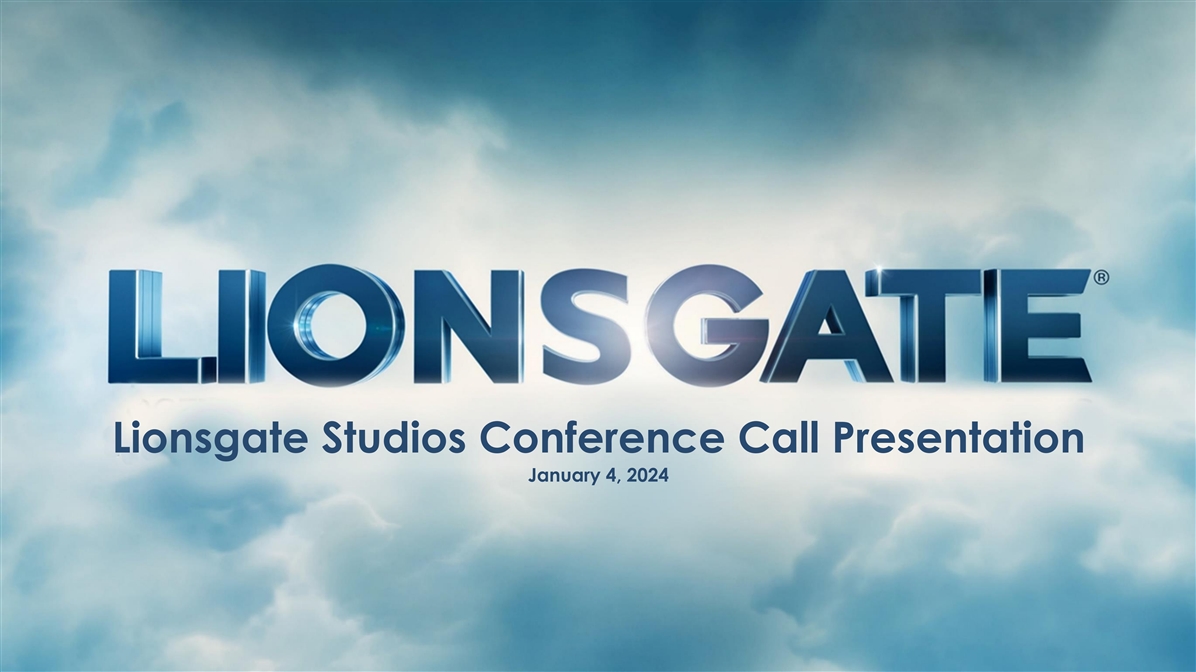
Lionsgate Studios Conference Call Presentation January 4, 2024

Disclaimer Forward-looking statements and risk factors This presentation (together with oral statements made in connection herewith, this “Presentation”) is provided for informational purposes only and has been prepared to with respect to a business combination involving LG Orion Holdings Inc. (“LG Studio” or the “Company”), a wholly owned subsidiary of Lions Gate Entertainment Corp. (“Lionsgate”) created to hold the Studio Business of Lionsgate (“Lionsgate Studios”) and SEAC Acquisition Corp. (“SEAC”) and related transactions (the “Proposed Business Combination”) and for no other purpose. All statements other than statements of historical facts contained in this Presentation are forward-looking statements. Forward looking statements may generally be identified by the use of words such as “believe,” “may,” “will,” “estimate,” “continue,” “anticipate,” “intend,” “expect,” “should,” “would,” “plan,” “project,” “forecast,” “predict,” “potential,” “seem,” “seek,” “future,” “outlook,” “target” or other similar expressions that predict or indicate future events or trends or that are not statements of historical matters. These forward-looking statements include, but are not limited to, statements regarding estimates and forecasts of financial and performance metrics and projections of market opportunity and m ark et share. These statements are based on management’s current estimations and analysis, are subject to various assumptions that the parties believe are reasonable at this time, whether or not identified in this Presentation, reflect the current expectations Lionsgate’s management as of the date of this Presentation and are not predictions of actual performance. These forward-looking statements are provided for illustrative purposes only and are not intended to serve as and must not be re lied on by any investor as, a guarantee, an assurance, a prediction or a definitive statement of fact or probability. Actual events and circumstances are difficult or impossible to predict and may differ from assumptions and such differences may be material. Many actual events and circumstances are beyond the control of LG Studio, Lionsgate and SEAC. These forward-looking statements are subject to a number of risks and uncertainties, including changes in domestic and foreign business, market, financial, political and legal conditions; the inability of the parties to successfully or timely consummate the Proposed Business Combination, including the risk that any required regulatory approvals are not obtained, are delayed or are subject to unanticipated conditions that could adversely affect the combined company or the expected benefits of the Proposed Business Combination or that the approval of the stockholders of SEAC is not obtained; failure to realize the anticipated benefits of the Proposed Business Combination; risks relating to the uncertainty of the projected financial information with respect to Lionsgate’s Studio business; the effects of competition on Lionsgate’s Studio business; the amount of redemption requests made by SEAC’s public stockholders; the ability of SEAC or the combined company to issue equity or equity linked securities in connection with the Proposed Business Combination or in the future; the risk of litigation and/or regulatory actions related to the Proposed Business Combination; diversion of management time from ongoing business operations due to the Proposed Business Combination; the risk that the Proposed Business Combination could have an adverse effect on the ability of Lionsgate’s Studio business to retain customers and retain and hire key personnel and maintain relationships with customers, suppliers, employees, stockholders and other business relationships; and those factors discussed under the heading “Risk Factors” in SEAC’s Annual Report on Form 10-K filed with the SEC on March 1, 2023, SEAC’s Quarterly Report on Form 10-Q filed with the SEC on September 9, 2023, Lionsgate’s Annual Report on Form 10-K filed with the SEC on May 25, 2023, Lionsgate’s Quarterly Report on Form 10 Q filed with the SEC on November 9, 2023, Lionsgate’s Proxy Statement Pursuant to Section 14(a) of the Securities Exchange Act of 1934 filed with the SEC on October 13, 2023, LG Studio’s registration statement on Form 10 filed with the SE C on July 12, 2023 and other periodic public filings of SEAC, LG Studio or Lionsgate filed, or to be filed, with the SEC, any provincial securities commissions or securities regulatory authorities in Canada, or on the SEDAR+ website at www.sedarplus.ca, as applicable . You should also carefully consider the risks and uncertainties described in the “Risk Factors” section of the proxy statement/prospectus on Form S-4 (or other applicable SEC form) relating to the Proposed Business Combination, which is expected to be filed with the SEC, and other documents filed from time to time with the SEC. These filings identify and address other important risks and uncertainties that could cause actual events and results to diverge materially from those contained in the forward-looking statements in this presentation. If any of these risks materialize or SEAC’s, Lionsgate’s or LG Studio’s assumptions prove incorrect, actual results could differ materially from the results implied by these forward-looking statements. There may be additional risks that neither SEAC, Lionsgate nor LG Studio presently know or that SEAC, Lionsgate and LG Studio currently believe are immaterial that could also cause actual results to differ from those contained in the forward-looking statements. In addition, forward looking statements reflect Lionsgate’s expectations, plans or forecasts of future events and views as of the date of this Presentation. SEAC, Lionsgate and LG Studio anticipate that subsequent events and developments will cause their assessments to change. It is not possible to predict all risks, nor assess the impact of all factors on LG Studio’s business or the extent to which any factor, or combination of factors, may cause LG Studio’s actual results, performance or financial condition to be materially different from the expectations of future results, performance or financial condition. In addition, the analyses of Lionsgate, LG Studio and SEAC contained herein are not, and do not purport to be, appraisals or the securities, assets or business of LG Studio, SEAC or any other entity. While SEAC, Lionsgate and LG Studio may elect to update these forward-looking statements at some point in the future, SEAC, Lionsgate and LG Studio specifically disclaim any obligation to do so. These forward-looking statements should not be relied upon as representing SEAC’s, Lionsgate’s and LG Studio’s assessments as of any date subsequent to the date of this Presentation. Accordingly, undue reliance should not be placed upon the forward-looking statements. Use of projections The projections, estimates and targets in this Presentation are forward looking statements that are based on assumptions that are inherently subject to significant uncertainties and contingences, many of which are beyond Lionsgate’s, LG Studio’s and SEAC’s control. Lionsgate’s and SEAC’s independent auditors did not audit, review, compile or perform any procedures with respect to such projections, estimates, or targets for the purpose of their inclusion in this Presentation, and accordingly, such auditors neither expressed an opinion nor provided any other form of assurance with respect thereto for the purpose of this Presentation. While all protections, estimates, and targets are necessarily speculative, LG Studio and Lionsgate believe that the preparation of prospective financial information involves increasingly higher levels of uncertainty the further out the projection, estimate, or target extends from the date of preparation. The assumptions and estimates underlying projected, expected, or targeted results are inherently uncertain and are subject to a wide variety of risks and uncertainties, including but not limited to those mentioned in the immediately preceding paragraph, that could cause actual results to differ materially from those contained in such projections, estimates, and targets. The inclusion of projections, estimates, and targets in this Presentation should not be regarded as an indication that Lionsgate, LG Studio, SEAC, or their respective representatives considered or consider such financial projections, estimates, and targets to be a reliable prediction of future events. See “Forward looking Statements” above. To the extent any forward-looking information in this presentation constitutes “future oriented financial information” or “financial outlooks” within the meaning of applicable Canadian securities laws, such information is being provided to demonstrate the potential benefits of the Proposed Business Combination, and the reader is cautioned that this information may not be appropriate for any other purpose and the reader should not place undue reliance on such future oriented financial information and financial outlooks. Future oriented financial information and financial outlooks, as with forward looking information generally, are, without limitation, based on the assumptions and subject to the risks set out herein. The results of operations and estimated and forecasted revenue of Lionsgate, LG Studio and/or SEAC may differ materially from management’s current expectations. Such information is presented for illustrative purposes only and may not be an indication of the actual future results of operations or earnings of Lionsgate, LG Studio and/or SEAC. 2

Disclaimer Industry and market data In this Presentation, Lionsgate and LG Studio may rely on and refer to certain information and statistics obtained from third party sources which they believe to be reliable. Lionsgate and LG Studio have not independently verified the accuracy or completeness of any such third-party information. No representation is made as to the reasonableness of the assumptions made within or the accuracy or completeness of any such third-party information, and you are cautioned not to place undue weight on such information. Additional Information About the Transaction and Where to Find It In connection with the transaction, a subsidiary of SEAC ( New SEAC ) intends to file with the U.S. Securities and Exchange Commission (the SEC ) a registration statement on Form S-4 (the Registration Statement ), which will include a preliminary proxy statement of SEAC and a preliminary prospectus of New SEAC, and after the Registration Statement is declared effective, SEAC will mail the definitive proxy statement/prospectus relating to the transaction to its shareholders and public warrant holders as of the respective record date to be established for voting at the meeting of its shareholders (the SEAC Shareholders Meeting ) and public warrant holders ( SEAC Public Warrant Holder Meeting ) to be held in connection with the transaction. The Registration Statement, including the proxy statement/prospectus contained therein, will contain important information about the transaction and the other matters to be voted upon at the SEAC Shareholders Meeting and SEAC Public Warrant Holder Meeting. This communication does not contain all the information that should be considered concerning the transaction and other matters and is not intended to provide the basis for any investment decision or any other decision in respect of such matters. SEAC, New SEAC and Lionsgate may also file other documents with the SEC regarding the transaction. SEAC's shareholders, public warrant holders and other interested persons are advised to read, when available, the Registration Statement, including the preliminary proxy statement/prospectus contained therein, the amendments thereto and the definitive proxy statement/prospectus and other documents filed in connection with the transaction, as these materials will contain important information about SEAC, New SEAC, Lionsgate, Studio Business and the transaction. SEAC's shareholders, public warrant holders and other interested persons will be able to obtain copies of the Registration Statement, including the preliminary proxy statement/prospectus contained therein, the definitive proxy statement/prospectus and other documents filed or that will be filed with the SEC, free of charge, by SEAC, New SEAC and Lionsgate through the website maintained by the SEC at www.sec.gov. Participants in the Solicitation SEAC, New SEAC, Lionsgate and their respective directors and officers may be deemed participants in the solicitation of proxies of SEAC shareholders and public warrant holders in connection with the transaction. More detailed information regarding the directors and officers of SEAC, and a description of their interests in SEAC, is contained in SEAC's filings with the SEC, including its Annual Report on Form 10-K for the fiscal year ended December 31, 2022, which was filed with the SEC on March 1, 2023, and is available free of charge at the SEC's website at www.sec.gov. Information regarding the persons who may, under SEC rules, be deemed participants in the solicitation of proxies of SEAC's shareholders and public warrant holders in connection with the transaction and other matters to be voted upon at the SEAC Shareholders Meeting and SEAC Public Warrant Holders Meeting will be set forth in the Registration Statement for the transaction when available. No Offer or Solicitation This communication does not constitute (i) a solicitation of a proxy, consent or authorization with respect to any securities or in respect of the transaction or (ii) an offer to sell, a solicitation of an offer to buy, or a recommendation to purchase, any securities of Lionsgate, SEAC, the combined company or any of their respective affiliates. No offering of securities shall be made except by means of a prospectus meeting the requirements of Section 10 of the Securities Act of 1933, as amended, or an exemption therefrom, nor shall any sale of securities in any states or jurisdictions in which such offer, solicitation or sale would be unlawful prior to registration or qualification under the securities laws of any such jurisdiction be affected. No securities commission or securities regulatory authority in the United States or any other jurisdiction has in any way passed upon the merits of the transaction or the accuracy or adequacy of this communication. Additional Information Available on Lionsgate's Website The information in this press release should be read in conjunction with the financial statements and footnotes contained in the Lionsgate Quarterly Report on Form 10-Q for the quarter ended September 30, 2023, which has been posted on Lionsgate's website at http://investors.lionsgate.com/financial-reports/sec-filings. 3

A Standalone Lionsgate Studios Unlocks Value as a Pure-Play Content Company Platform-Agnostic, Pure-Play Content Studio Benefits from a $2.9Bn 1 Changing Industry Ecosystem FY24E Revenue Double Digit Lower Risk Film and TV Model Generates Strong, Steady FY24E to FY25E 2 AOIBDA Growth AOIBDA Growth +12.5% Deep Portfolio of Franchise Film and TV Intellectual Property 3 Reported Library and Enduring Library Rights (1) Revenue CAGR Focused M&A Strategy to Enhance the Library and Core 14 4 Acquisitions Business Segments (2) Since 2000 10.7x 28.8x 5 Unique and Valuable Strategic Asset Investor Median Historical (3) (4) Entry Multiple Takeout Comps Enables Direct Investment in a Standalone Studio and its World-Class IP with a Single Share Class Notes: 1. FY2019A-FY2023A CAGR; Reported Library Revenue is defined as revenue earned after the first cycle of sales which generally includes theatrical revenue, the first six months of home entertainment sales, the first pay television contract and the minimum guarantees from the first international sales 2. Excludes streaming and media networks acquisitions; Excludes joint ventures, STARZ and disposed assets 3. Enterprise Value / FY2025E adjusted OIBDA including illustrative annual run rate post-synergies eOne adjusted OIBDA contribution 4. Based on precedent transactions LTM Enterprise Value to EBITDA 4

Business Segments M&A Strategic Value Business Model Lionsgate Studios: An Independent Premium IP and Content Company with the Scale of a Major MOTION PICTURE TELEVISION LIBRARY Airing Across $10Bn+ 80+ 50+ 20K+ (4) (4) (1) (6) Television Series Networks Global Box Office Over Last 10 Years Films and TV Episodes 40-50 400+ ~60% (2) (5) Releases Per Year Average Episodes Produced Annually Of Reported Library Revenue from Titles Released Since 2013 $1.6Bn $1.5Bn $870MM (3) (3) (7) LTM Revenue LTM Revenue LTM Reported Library Revenue (8) 754 Major Award Nominations / 130 Major Award Wins 238 / 52 259 / 38 257 / 40 Academy Award Emmy Award Golden Globe Nominations / Wins Nominations / Wins Nominations / Wins Notes: 1. Management estimates through end of CY2023 6. Includes eOne titles 2. Includes wide-release, multi-platform and direct-to-platform titles 7. As of 9/30/2023; Includes film and TV revenues; Reported Library Revenue is defined as revenue earned after the first cycle of sales which 3. Last Twelve Months (‘LTM’) as of 9/30/2023 generally includes theatrical revenue, the first six months of home entertainment sales, the first pay television contract and the minimum 4. Includes Scripted TV, Unscripted TV, Debmar Mercury, Pilgrim and distribution throughout FY23A. Does not include 3 Arts executive produced guarantees from the first international sales series 8. Award numbers include created and acquired content 5. Average across scripted and unscripted content from FY2019 through FY2023; Does not include Debmar Mercury 5

Business Segments M&A Strategic Value Business Model Lionsgate Studios’ Business Model Benefits from a Changing Industry Ecosystem MAJOR STUDIOS Agile, Platform-Agnostic Studio Organized Legacy Studio Economics Impacted by Linear Across Motion Picture, Television and Networks and Investments in Vertically Talent Management Integrated Streaming Platforms Large IP Bases and Deep Portfolios of Content Large IP Bases and Deep Portfolios of Content Optionality to License at Competitive Rates Bound to Vertically Integrated Captive Platforms Focus on International Licensing De-Risks Downside Large Self-Distribution Infrastructure Increases Risk 6

Business Segments M&A Strategic Value Business Model A Top Content Licensor to All Global Distribution Channels Theatrical Television Streaming International BUSINESS MODEL WITH ASYMMETRIC UPSIDE License at Competitive Maximize Measured-to-Nil Market Rates Rights Retention Deficits / Gap 7
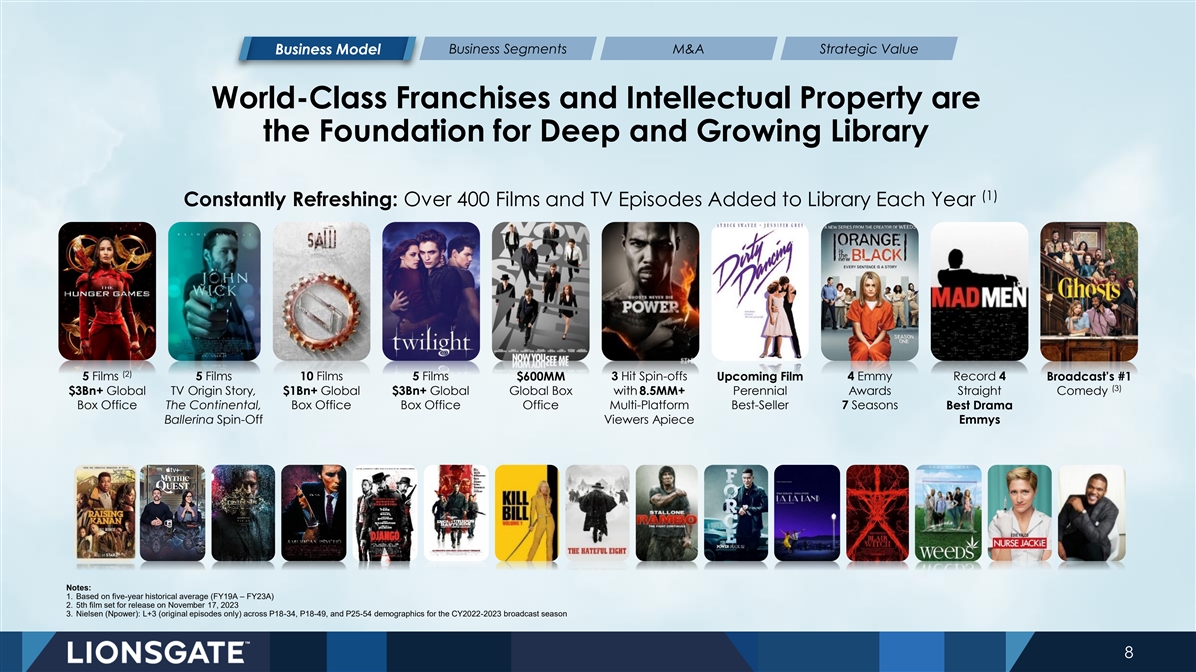
Business Segments M&A Strategic Value Business Model World-Class Franchises and Intellectual Property are the Foundation for Deep and Growing Library (1) Constantly Refreshing: Over 400 Films and TV Episodes Added to Library Each Year (2) 5 Films 5 Films 10 Films 5 Films $600MM 3 Hit Spin-offs Upcoming Film 4 Emmy Record 4 Broadcast’s #1 (3) $3Bn+ Global TV Origin Story, $1Bn+ Global $3Bn+ Global Global Box with 8.5MM+ Perennial Awards Straight Comedy Box Office The Continental, Box Office Box Office Office Multi-Platform Best-Seller 7 Seasons Best Drama Ballerina Spin-Off Viewers Apiece Emmys Notes: 1. Based on five-year historical average (FY19A – FY23A) 2. 5th film set for release on November 17, 2023 3. Nielsen (Npower): L+3 (original episodes only) across P18-34, P18-49, and P25-54 demographics for the CY2022-2023 broadcast season 8
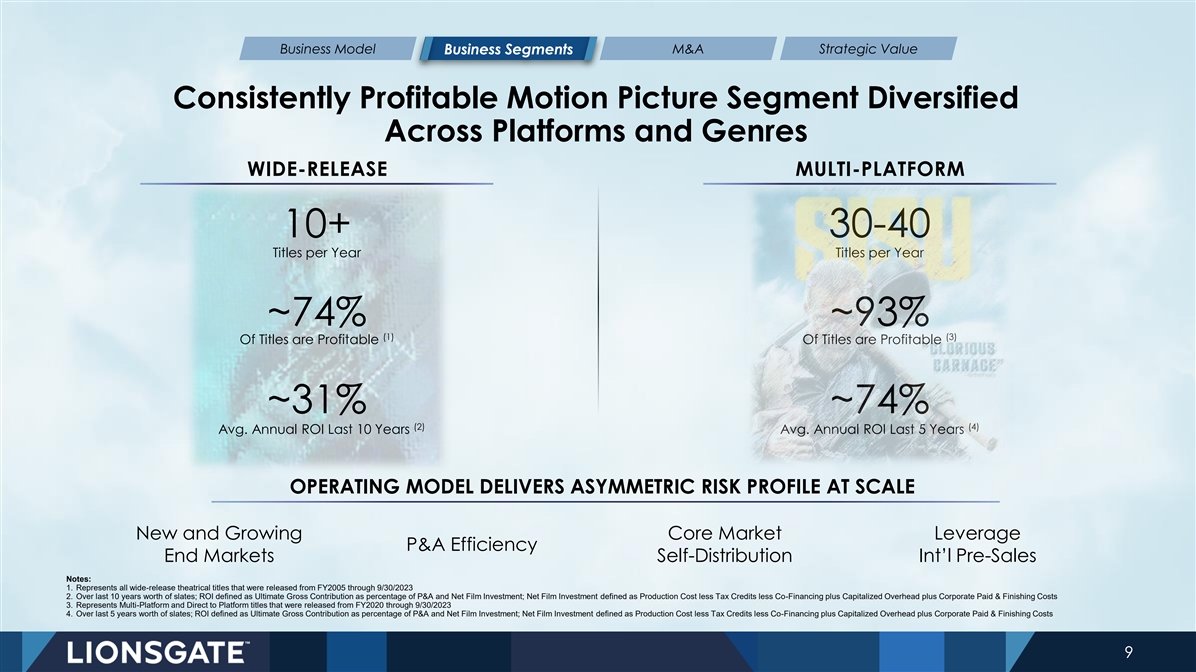
Business Model M&A Strategic Value Business Segments Consistently Profitable Motion Picture Segment Diversified Across Platforms and Genres WIDE-RELEASE MULTI-PLATFORM 10+ 30-40 Titles per Year Titles per Year ~74% ~93% (1) (3) Of Titles are Profitable Of Titles are Profitable ~31% ~74% (2) (4) Avg. Annual ROI Last 10 Years Avg. Annual ROI Last 5 Years OPERATING MODEL DELIVERS ASYMMETRIC RISK PROFILE AT SCALE New and Growing Core Market Leverage P&A Efficiency End Markets Self-Distribution Int’l Pre-Sales Notes: 1. Represents all wide-release theatrical titles that were released from FY2005 through 9/30/2023 2. Over last 10 years worth of slates; ROI defined as Ultimate Gross Contribution as percentage of P&A and Net Film Investment; Net Film Investment defined as Production Cost less Tax Credits less Co-Financing plus Capitalized Overhead plus Corporate Paid & Finishing Costs 3. Represents Multi-Platform and Direct to Platform titles that were released from FY2020 through 9/30/2023 4. Over last 5 years worth of slates; ROI defined as Ultimate Gross Contribution as percentage of P&A and Net Film Investment; Net Film Investment defined as Production Cost less Tax Credits less Co-Financing plus Capitalized Overhead plus Corporate Paid & Finishing Costs 9

Business Model M&A Strategic Value Business Segments Motion Picture Pipeline Drives Future Growth and Library Value 1-2 Existing Franchise IP Releases per Year 1 New Tentpole IP Approximately 60 Release per Year Film Projects in Development at 3-4 Original IP with Any Given Time Franchise Potential Releases per Year 5-6 Low-Risk Commercial Films Releases per Year 10
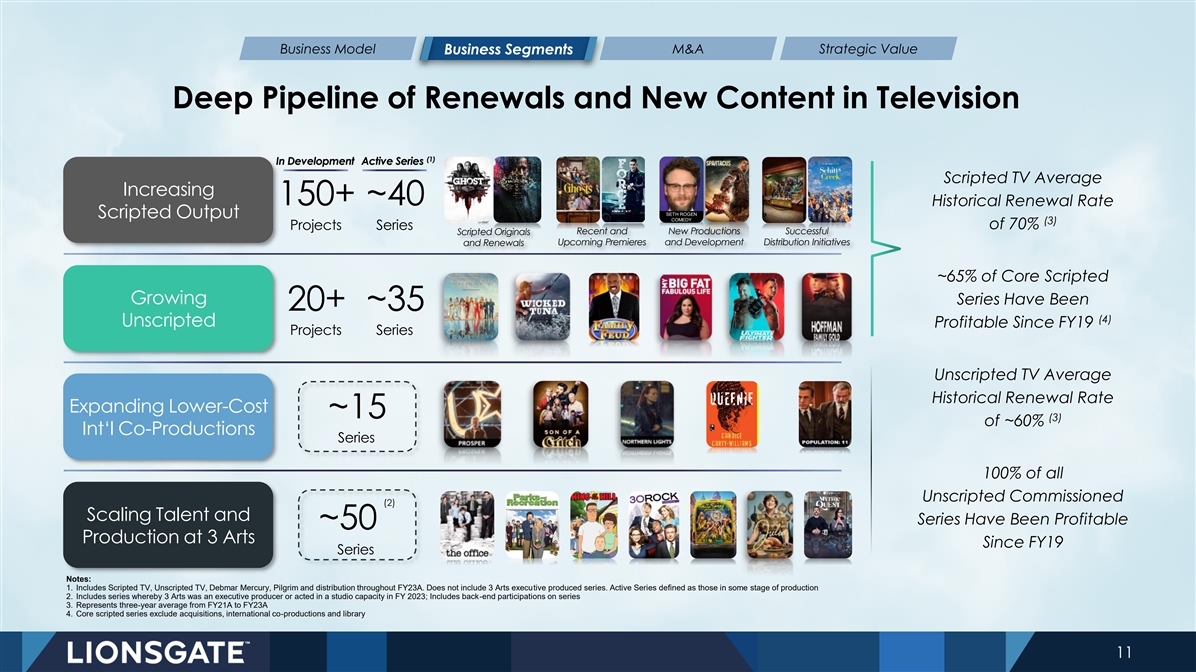
Business Model M&A Strategic Value Business Segments Deep Pipeline of Renewals and New Content in Television (1) In Development Active Series Scripted TV Average Increasing 150+ ~40 Historical Renewal Rate SETH ROGEN Scripted Output COMEDY (3) of 70% Projects Series Scripted Originals Recent and New Productions Successful Upcoming Premieres and Development Distribution Initiatives and Renewals ~65% of Core Scripted Growing Series Have Been 20+ ~35 (4) Unscripted Profitable Since FY19 Projects Series Unscripted TV Average Historical Renewal Rate Expanding Lower-Cost ~15 (3) of ~60% Int‘l Co-Productions Series 100% of all Unscripted Commissioned (2) Scaling Talent and Series Have Been Profitable ~50 Production at 3 Arts Since FY19 Series Notes: 1. Includes Scripted TV, Unscripted TV, Debmar Mercury, Pilgrim and distribution throughout FY23A. Does not include 3 Arts executive produced series. Active Series defined as those in some stage of production 2. Includes series whereby 3 Arts was an executive producer or acted in a studio capacity in FY 2023; Includes back-end participations on series 3. Represents three-year average from FY21A to FY23A 4. Core scripted series exclude acquisitions, international co-productions and library 11

Business Model M&A Strategic Value Business Segments One of the World’s Leading Talent Management and Production Companies Marquee Productions ➢ Manages A-List Client Roster of Directors, Writers, Showrunners, Actors and Comedians ➢ Prolific Production Business Including Extensive Co-Production Track Record with Lionsgate Studios Co-Productions Between 3 Arts and Lionsgate ➢ Fast Growing Business With Multiple Revenue Sources Driving +2x EBITDA Increase from FY2019A to FY2023A ➢ 30 Year Operating History, Led by Industry Veterans Talent Management is One of the Most Desirable Sectors Within Entertainment, Attracting Huge Amounts of Capital and Premium Multiples Note: Lionsgate Studios owns 76% stake in 3 Arts 12
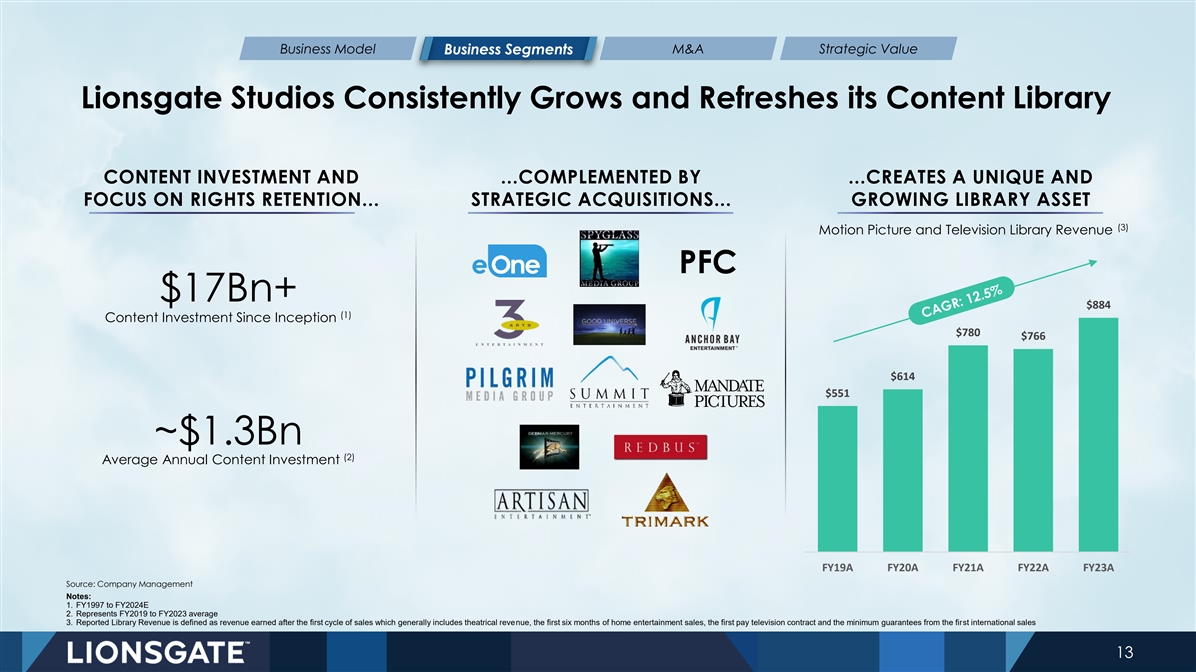
Business Model M&A Strategic Value Business Segments Lionsgate Studios Consistently Grows and Refreshes its Content Library CONTENT INVESTMENT AND ...COMPLEMENTED BY ...CREATES A UNIQUE AND FOCUS ON RIGHTS RETENTION... STRATEGIC ACQUISITIONS... GROWING LIBRARY ASSET (3) Motion Picture and Television Library Revenue PFC $17Bn+ $884 (1) Content Investment Since Inception $780 $766 $614 $551 ~$1.3Bn (2) Average Annual Content Investment FY19A FY20A FY21A FY22A FY23A Source: Company Management Notes: 1. FY1997 to FY2024E 2. Represents FY2019 to FY2023 average 3. Reported Library Revenue is defined as revenue earned after the first cycle of sales which generally includes theatrical revenue, the first six months of home entertainment sales, the first pay television contract and the minimum guarantees from the first international sales 13
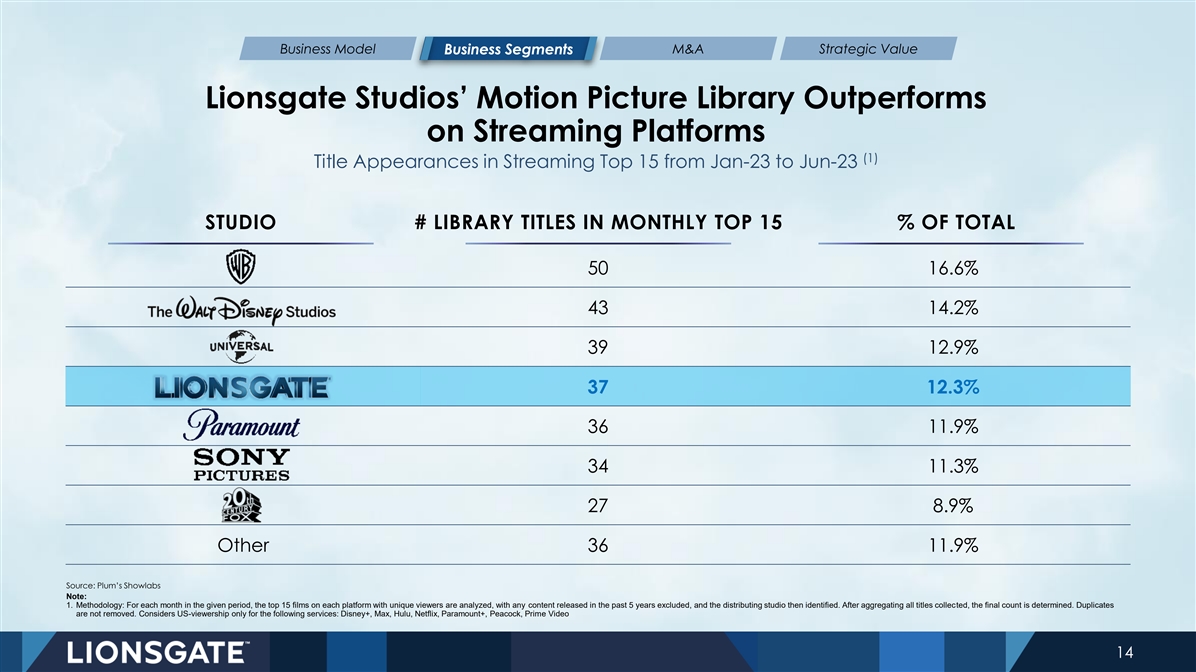
Business Model M&A Strategic Value Business Segments Lionsgate Studios’ Motion Picture Library Outperforms on Streaming Platforms (1) Title Appearances in Streaming Top 15 from Jan-23 to Jun-23 STUDIO # LIBRARY TITLES IN MONTHLY TOP 15 % OF TOTAL 50 16.6% 43 14.2% 39 12.9% 37 12.3% 36 11.9% 34 11.3% 27 8.9% Other 36 11.9% Source: Plum’s Showlabs Note: 1. Methodology: For each month in the given period, the top 15 films on each platform with unique viewers are analyzed, with any content released in the past 5 years excluded, and the distributing studio then identified. After aggregating all titles collected, the final count is determined. Duplicates are not removed. Considers US-viewership only for the following services: Disney+, Max, Hulu, Netflix, Paramount+, Peacock, Prime Video 14
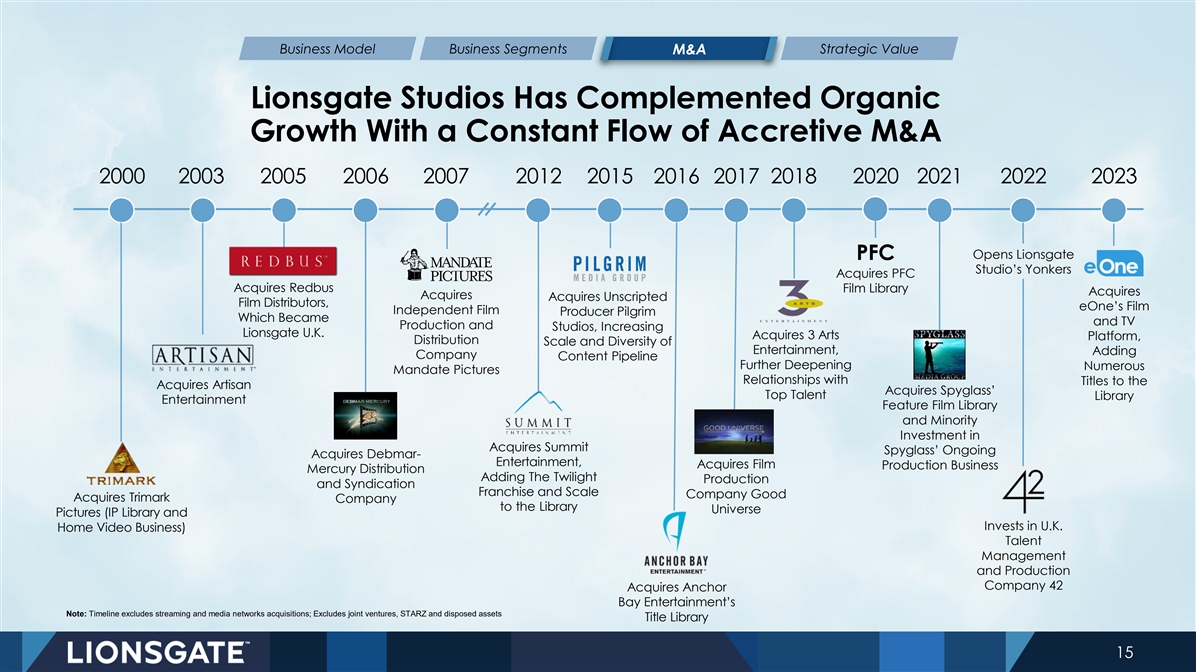
Business Model Business Segments Strategic Value M&A Lionsgate Studios Has Complemented Organic Growth With a Constant Flow of Accretive M&A 2000 2003 2005 2006 2007 2012 2015 2016 2017 2018 2020 2021 2022 2023 Opens Lionsgate PFC Studio’s Yonkers Acquires PFC Acquires Redbus Film Library Acquires Acquires Acquires Unscripted Film Distributors, eOne’s Film Independent Film Producer Pilgrim Which Became and TV Production and Studios, Increasing Lionsgate U.K. Acquires 3 Arts Platform, Distribution Scale and Diversity of Entertainment, Adding Company Content Pipeline Further Deepening Numerous Mandate Pictures Relationships with Titles to the Acquires Artisan Acquires Spyglass’ Top Talent Library Entertainment Feature Film Library and Minority Investment in Acquires Summit Spyglass’ Ongoing Acquires Debmar- Entertainment, Acquires Film Production Business Mercury Distribution Adding The Twilight Production and Syndication Franchise and Scale Company Good Acquires Trimark Company to the Library Universe Pictures (IP Library and Invests in U.K. Home Video Business) Talent Management and Production Company 42 Acquires Anchor Bay Entertainment’s Note: Timeline excludes streaming and media networks acquisitions; Excludes joint ventures, STARZ and disposed assets Title Library 15
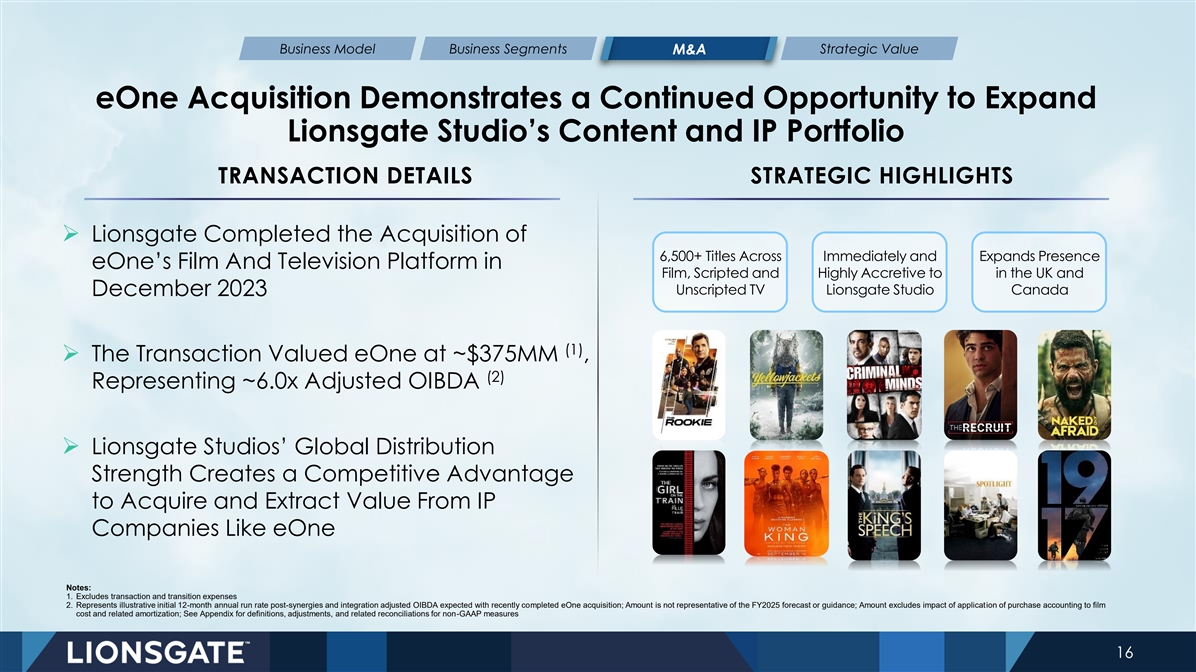
Business Model Business Segments Strategic Value M&A eOne Acquisition Demonstrates a Continued Opportunity to Expand Lionsgate Studio’s Content and IP Portfolio TRANSACTION DETAILS STRATEGIC HIGHLIGHTS ➢ Lionsgate Completed the Acquisition of 6,500+ Titles Across Immediately and Expands Presence eOne’s Film And Television Platform in Film, Scripted and Highly Accretive to in the UK and Unscripted TV Lionsgate Studio Canada December 2023 (1) ➢ The Transaction Valued eOne at ~$375MM , (2) Representing ~6.0x Adjusted OIBDA ➢ Lionsgate Studios’ Global Distribution Strength Creates a Competitive Advantage to Acquire and Extract Value From IP Companies Like eOne Notes: 1. Excludes transaction and transition expenses 2. Represents illustrative initial 12-month annual run rate post-synergies and integration adjusted OIBDA expected with recently completed eOne acquisition; Amount is not representative of the FY2025 forecast or guidance; Amount excludes impact of application of purchase accounting to film cost and related amortization; See Appendix for definitions, adjustments, and related reconciliations for non-GAAP measures 16
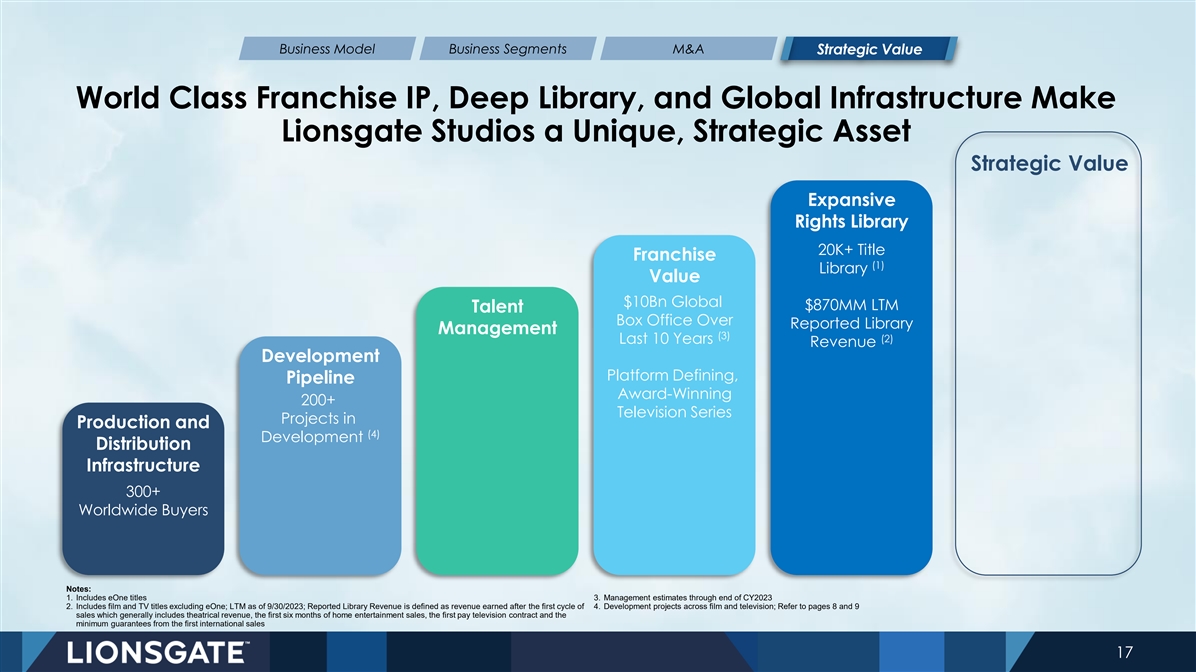
Business Model Business Segments M&A Strategic Value World Class Franchise IP, Deep Library, and Global Infrastructure Make Lionsgate Studios a Unique, Strategic Asset Strategic Value Expansive Rights Library 20K+ Title Franchise (1) Library Value $10Bn Global $870MM LTM Talent Box Office Over Reported Library Management (3) (2) Last 10 Years Revenue Development Platform Defining, Pipeline Award-Winning 200+ Television Series Projects in Production and (4) Development Distribution Infrastructure 300+ Worldwide Buyers Notes: 1. Includes eOne titles 3. Management estimates through end of CY2023 2. Includes film and TV titles excluding eOne; LTM as of 9/30/2023; Reported Library Revenue is defined as revenue earned after the first cycle of 4. Development projects across film and television; Refer to pages 8 and 9 sales which generally includes theatrical revenue, the first six months of home entertainment sales, the first pay television contract and the minimum guarantees from the first international sales 17
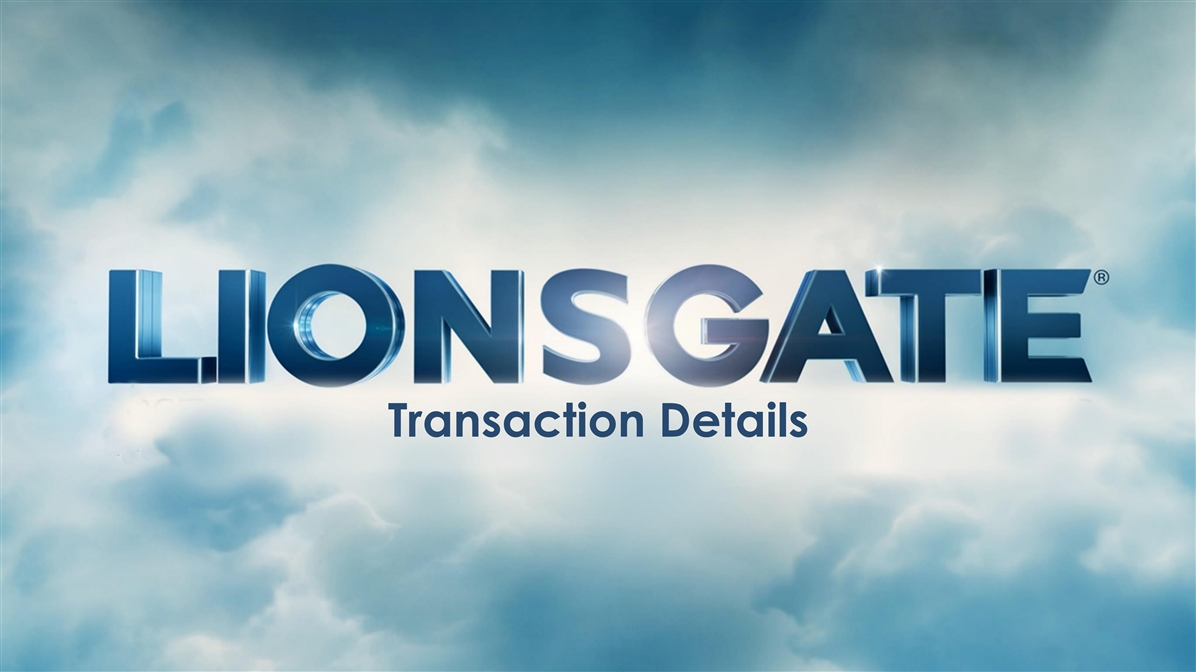
Transaction Details
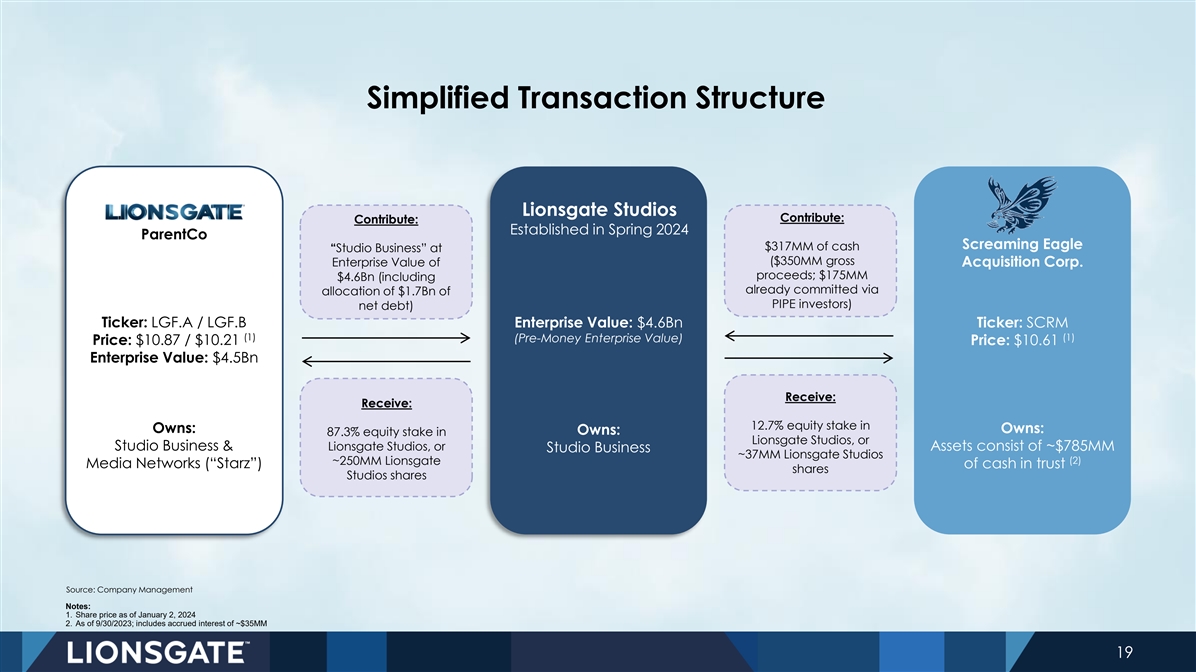
Simplified Transaction Structure Lionsgate Studios Contribute: Contribute: Established in Spring 2024 ParentCo Screaming Eagle $317MM of cash “Studio Business” at ($350MM gross Enterprise Value of Acquisition Corp. proceeds; $175MM $4.6Bn (including already committed via allocation of $1.7Bn of PIPE investors) net debt) Ticker: LGF.A / LGF.B Enterprise Value: $4.6Bn Ticker: SCRM (1) (1) (Pre-Money Enterprise Value) Price: $10.87 / $10.21 Price: $10.61 Enterprise Value: $4.5Bn Receive: Receive: 12.7% equity stake in Owns: Owns: Owns: 87.3% equity stake in Lionsgate Studios, or Studio Business & Lionsgate Studios, or Assets consist of ~$785MM Studio Business ~37MM Lionsgate Studios (2) ~250MM Lionsgate Media Networks (“Starz”) of cash in trust shares Studios shares Source: Company Management Notes: 1. Share price as of January 2, 2024 2. As of 9/30/2023; includes accrued interest of ~$35MM 19
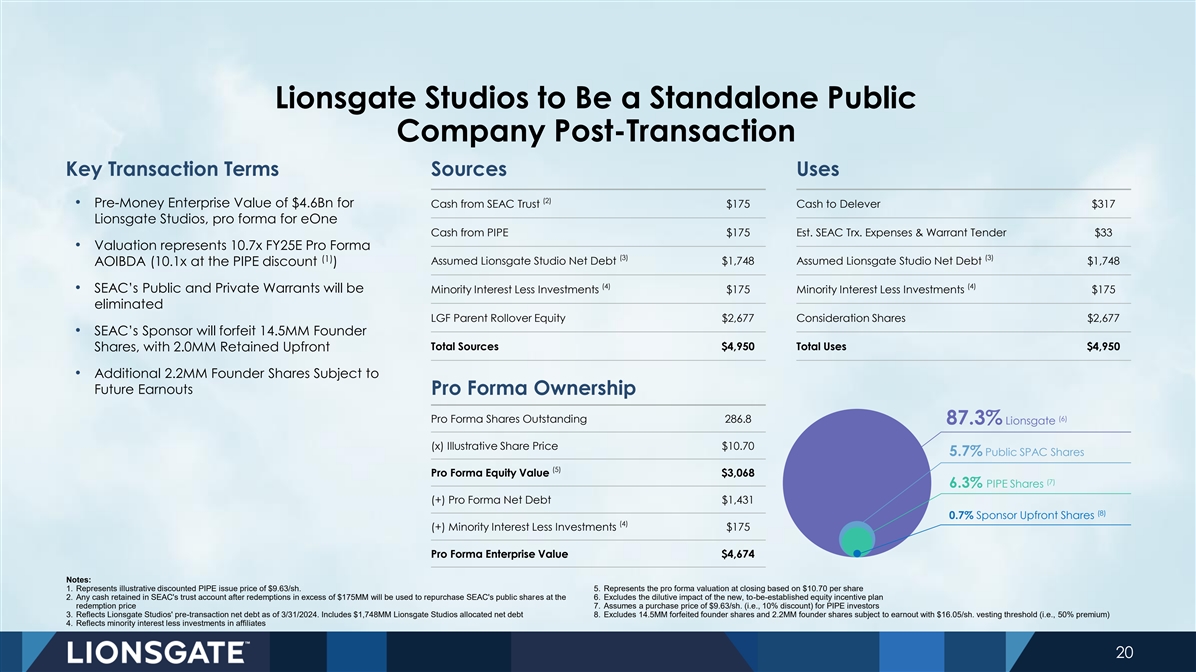
Lionsgate Studios to Be a Standalone Public Company Post-Transaction Key Transaction Terms Sources Uses (2) • Pre-Money Enterprise Value of $4.6Bn for Cash from SEAC Trust $175 Cash to Delever $317 Lionsgate Studios, pro forma for eOne Cash from PIPE $175 Est. SEAC Trx. Expenses & Warrant Tender $33 • Valuation represents 10.7x FY25E Pro Forma (3) (3) (1) Assumed Lionsgate Studio Net Debt $1,748 Assumed Lionsgate Studio Net Debt $1,748 AOIBDA (10.1x at the PIPE discount ) (4) (4) • SEAC’s Public and Private Warrants will be Minority Interest Less Investments $175 Minority Interest Less Investments $175 eliminated LGF Parent Rollover Equity $2,677 Consideration Shares $2,677 • SEAC’s Sponsor will forfeit 14.5MM Founder Total Sources $4,950 Total Uses $4,950 Shares, with 2.0MM Retained Upfront • Additional 2.2MM Founder Shares Subject to Future Earnouts Pro Forma Ownership (6) Pro Forma Shares Outstanding 286.8 87.3% Lionsgate (x) Illustrative Share Price $10.70 5.7% Public SPAC Shares (5) Pro Forma Equity Value $3,068 (7) 6.3% PIPE Shares (+) Pro Forma Net Debt $1,431 (8) 0.7% Sponsor Upfront Shares (4) (+) Minority Interest Less Investments $175 Pro Forma Enterprise Value $4,674 Notes: 1. Represents illustrative discounted PIPE issue price of $9.63/sh. 5. Represents the pro forma valuation at closing based on $10.70 per share 2. Any cash retained in SEAC's trust account after redemptions in excess of $175MM will be used to repurchase SEAC's public shares at the 6. Excludes the dilutive impact of the new, to-be-established equity incentive plan redemption price 7. Assumes a purchase price of $9.63/sh. (i.e., 10% discount) for PIPE investors 3. Reflects Lionsgate Studios' pre-transaction net debt as of 3/31/2024. Includes $1,748MM Lionsgate Studios allocated net debt 8. Excludes 14.5MM forfeited founder shares and 2.2MM founder shares subject to earnout with $16.05/sh. vesting threshold (i.e., 50% premium) 4. Reflects minority interest less investments in affiliates 20
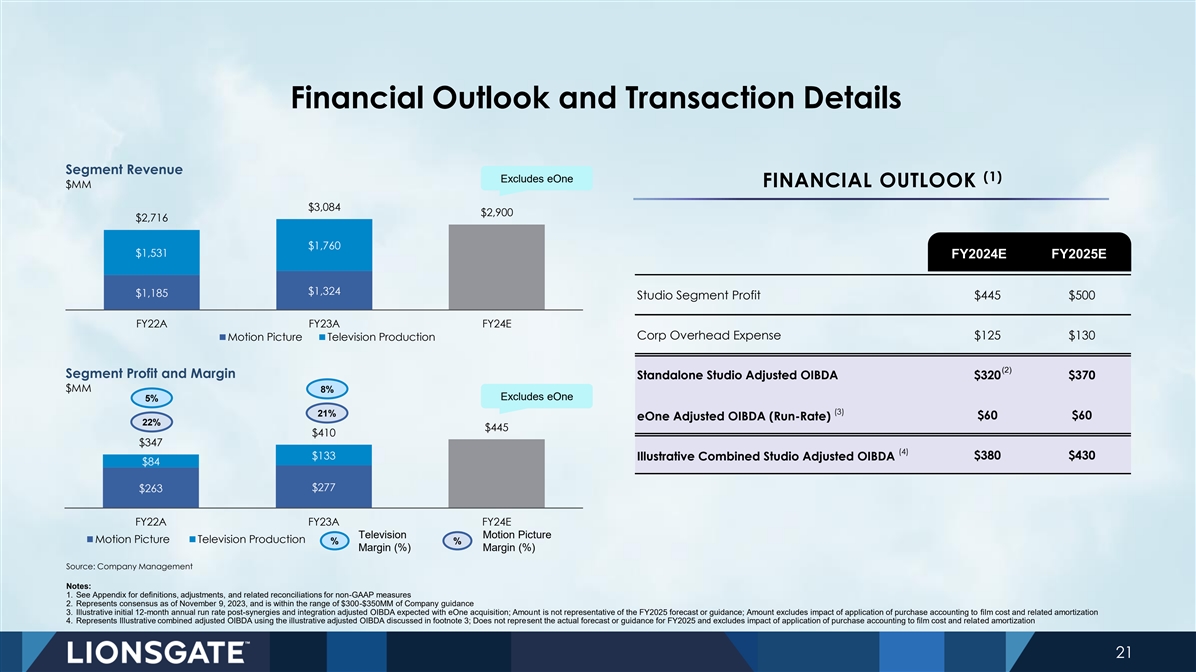
Financial Outlook and Transaction Details Segment Revenue (1) Excludes eOne $MM FINANCIAL OUTLOOK $3,084 $2,900 $2,716 $1,760 $1,531 FY2024E FY2025E $1,324 $1,185 Studio Segment Profit $445 $500 FY22A FY23A FY24E Corp Overhead Expense $125 $130 Motion Picture Television Production (2) Segment Profit and Margin Standalone Studio Adjusted OIBDA $320 $370 $MM 8% Excludes eOne 5% (3) 21% eOne Adjusted OIBDA (Run-Rate) $60 $60 22% $445 $410 $347 (4) $133 Illustrative Combined Studio Adjusted OIBDA $380 $430 $84 $277 $263 FY22A FY23A FY24E Television Motion Picture Motion Picture Television Production % % Margin (%) Margin (%) Source: Company Management Notes: 1. See Appendix for definitions, adjustments, and related reconciliations for non-GAAP measures 2. Represents consensus as of November 9, 2023, and is within the range of $300-$350MM of Company guidance 3. Illustrative initial 12-month annual run rate post-synergies and integration adjusted OIBDA expected with eOne acquisition; Amount is not representative of the FY2025 forecast or guidance; Amount excludes impact of application of purchase accounting to film cost and related amortization 4. Represents Illustrative combined adjusted OIBDA using the illustrative adjusted OIBDA discussed in footnote 3; Does not represent the actual forecast or guidance for FY2025 and excludes impact of application of purchase accounting to film cost and related amortization 21
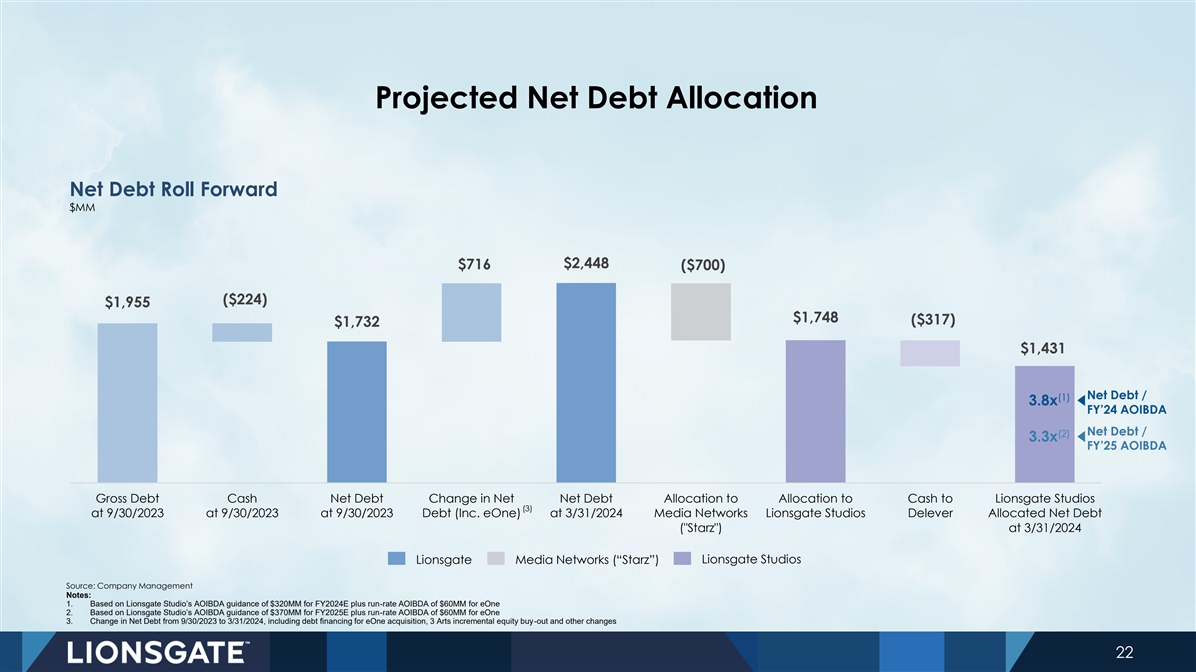
Projected Net Debt Allocation Net Debt Roll Forward $MM $2,448 $716 ($700) ($224) $1,955 $1,748 ($317) $1,732 $1,431 Net Debt / (1) 3.8x FY’24 AOIBDA Net Debt / (2) 3.3x FY’25 AOIBDA Gross Debt Cash Net Debt Change in Net Net Debt Allocation to Allocation to Cash to Lionsgate Studios (3) at 9/30/2023 at 9/30/2023 at 9/30/2023 Debt (Inc. eOne) at 3/31/2024 Media Networks Lionsgate Studios Delever Allocated Net Debt ( Starz ) at 3/31/2024 Lionsgate Media Networks (“Starz”) Lionsgate Studios Source: Company Management Notes: 1. Based on Lionsgate Studio’s AOIBDA guidance of $320MM for FY2024E plus run-rate AOIBDA of $60MM for eOne 2. Based on Lionsgate Studio’s AOIBDA guidance of $370MM for FY2025E plus run-rate AOIBDA of $60MM for eOne 3. Change in Net Debt from 9/30/2023 to 3/31/2024, including debt financing for eOne acquisition, 3 Arts incremental equity buy-out and other changes 22
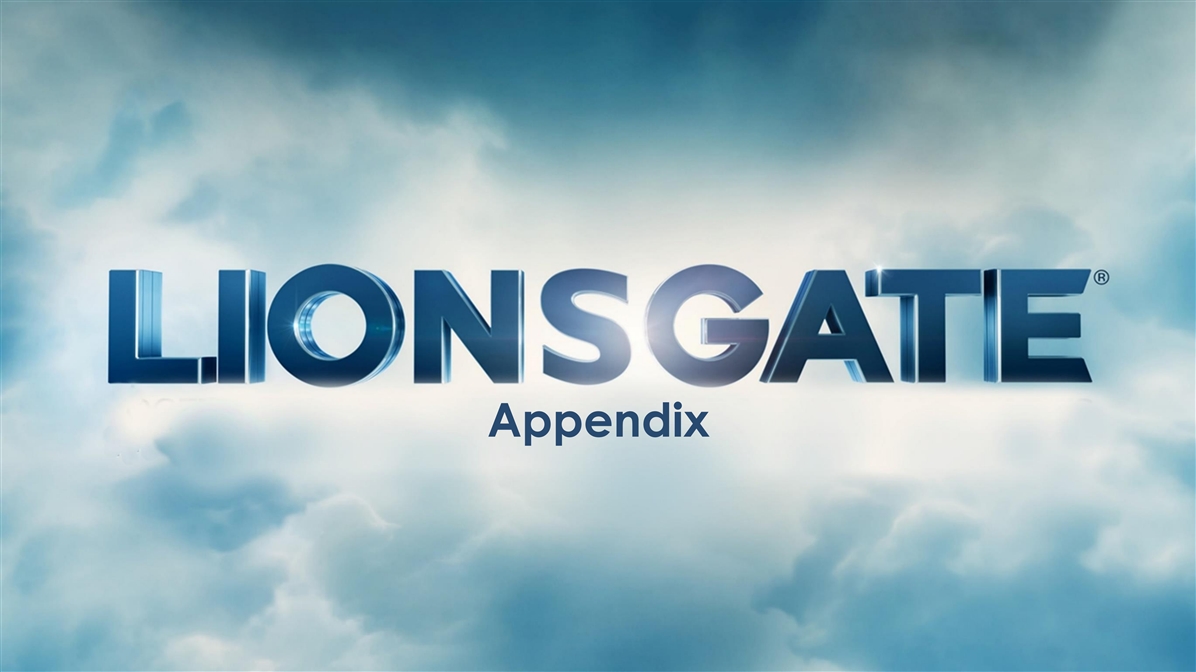
Appendix
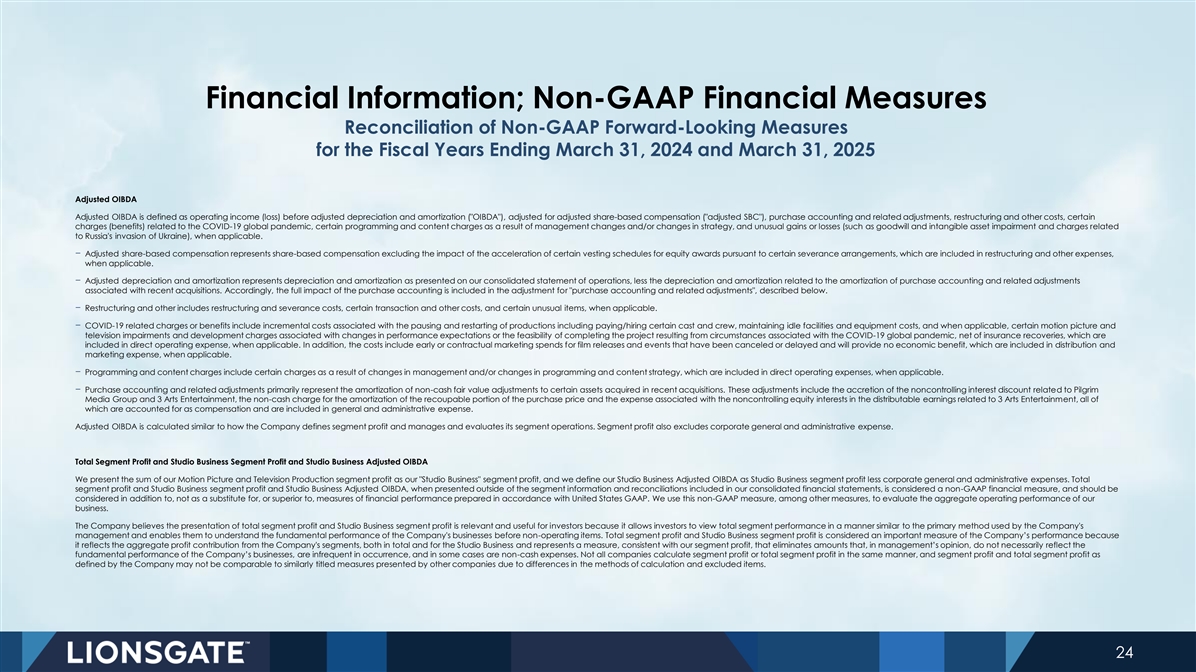
Financial Information; Non-GAAP Financial Measures Reconciliation of Non-GAAP Forward-Looking Measures for the Fiscal Years Ending March 31, 2024 and March 31, 2025 Adjusted OIBDA Adjusted OIBDA is defined as operating income (loss) before adjusted depreciation and amortization ( OIBDA ), adjusted for adjusted share-based compensation ( adjusted SBC ), purchase accounting and related adjustments, restructuring and other costs, certain charges (benefits) related to the COVID-19 global pandemic, certain programming and content charges as a result of management changes and/or changes in strategy, and unusual gains or losses (such as goodwill and intangible asset impairment and charges related to Russia's invasion of Ukraine), when applicable. − Adjusted share-based compensation represents share-based compensation excluding the impact of the acceleration of certain vesting schedules for equity awards pursuant to certain severance arrangements, which are included in restructuring and other expenses, when applicable. − Adjusted depreciation and amortization represents depreciation and amortization as presented on our consolidated statement of operations, less the depreciation and amortization related to the amortization of purchase accounting and related adjustments associated with recent acquisitions. Accordingly, the full impact of the purchase accounting is included in the adjustment for purchase accounting and related adjustments , described below. − Restructuring and other includes restructuring and severance costs, certain transaction and other costs, and certain unusual items, when applicable. − COVID-19 related charges or benefits include incremental costs associated with the pausing and restarting of productions including paying/hiring certain cast and crew, maintaining idle facilities and equipment costs, and when applicable, certain motion picture and television impairments and development charges associated with changes in performance expectations or the feasibility of completing the project resulting from circumstances associated with the COVID-19 global pandemic, net of insurance recoveries, which are included in direct operating expense, when applicable. In addition, the costs include early or contractual marketing spends for film releases and events that have been canceled or delayed and will provide no economic benefit, which are included in distribution and marketing expense, when applicable. − Programming and content charges include certain charges as a result of changes in management and/or changes in programming and content strategy, which are included in direct operating expenses, when applicable. − Purchase accounting and related adjustments primarily represent the amortization of non-cash fair value adjustments to certain assets acquired in recent acquisitions. These adjustments include the accretion of the noncontrolling interest discount related to Pilgrim Media Group and 3 Arts Entertainment, the non-cash charge for the amortization of the recoupable portion of the purchase price and the expense associated with the noncontrolling equity interests in the distributable earnings related to 3 Arts Entertainment, all of which are accounted for as compensation and are included in general and administrative expense. Adjusted OIBDA is calculated similar to how the Company defines segment profit and manages and evaluates its segment operations. Segment profit also excludes corporate general and administrative expense. Total Segment Profit and Studio Business Segment Profit and Studio Business Adjusted OIBDA We present the sum of our Motion Picture and Television Production segment profit as our Studio Business segment profit, and we define our Studio Business Adjusted OIBDA as Studio Business segment profit less corporate general and administrative expenses. Total segment profit and Studio Business segment profit and Studio Business Adjusted OIBDA, when presented outside of the segment information and reconciliations included in our consolidated financial statements, is considered a non-GAAP financial measure, and should be considered in addition to, not as a substitute for, or superior to, measures of financial performance prepared in accordance with United States GAAP. We use this non-GAAP measure, among other measures, to evaluate the aggregate operating performance of our business. The Company believes the presentation of total segment profit and Studio Business segment profit is relevant and useful for investors because it allows investors to view total segment performance in a manner similar to the primary method used by the Company's management and enables them to understand the fundamental performance of the Company's businesses before non-operating items. Total segment profit and Studio Business segment profit is considered an important measure of the Company’s performance because it reflects the aggregate profit contribution from the Company's segments, both in total and for the Studio Business and represents a measure, consistent with our segment profit, that eliminates amounts that, in management’s opinion, do not necessarily reflect the fundamental performance of the Company’s businesses, are infrequent in occurrence, and in some cases are non-cash expenses. Not all companies calculate segment profit or total segment profit in the same manner, and segment profit and total segment profit as defined by the Company may not be comparable to similarly titled measures presented by other companies due to differences in the methods of calculation and excluded items. 24

Financial Information; Non-GAAP Financial Measures Reconciliation of Non-GAAP Forward-Looking Measures for the Fiscal Years Ending March 31, 2024 and March 31, 2025 Overall These measures are non-GAAP financial measures as defined in Regulation G promulgated by the SEC and are in addition to, not a substitute for, or superior to, measures of financial performance prepared in accordance with United States GAAP. We use these non-GAAP measures, among other measures, to evaluate the operating performance of our business. We believe these measures provide useful information to investors regarding our results of operations and cash flows before non-operating items. Adjusted OIBDA is considered an important measure of the Company’s performance because this measure eliminates amounts that, in management’s opinion, do not necessarily reflect the fundamental performance of the Company’s businesses, are infrequent in occurrence, and in some cases are non-cash expenses. These non-GAAP measures are commonly used in the entertainment industry and by financial analysts and others who follow the industry to measure operating performance. However, not all companies calculate these measures in the same manner and the measures as presented may not be comparable to similarly titled measures presented by other companies due to differences in the methods of calculation and excluded items. A general limitation of these non-GAAP financial measures is that they are not prepared in accordance with U.S. generally accepted accounting principles. These measures should be reviewed in conjunction with the relevant GAAP financial measures and are not presented as alternative measures of operating income as determined in accordance with GAAP. The following table sets forth Total Studio Business segment profit, Studio Business Adjusted OIBDA and Adjusted OIBDA on an actual basis for the fiscal years ended March 31, 2022 and 2023 and forecasted for the fiscal years ended March 31, 2024 and 2025: Fiscal Year Fiscal Year Fiscal Year Fiscal Year Ended Ended Ended Ended March 31, March 31, March 31, March 31, 2022 2023 2024 2025 Actual Actual Estimated Estimated (Unaudited, amounts in millions) (1) Total Studio Business Segment Profit $346.8 $409.9 $445.0 $500.0 Corporate general and administrative expenses (97.1) (122.9) (125.0) (130.0) (1) (2) $249.7 $287.0 $320.0 $370.0 Studio Business Adjusted OIBDA (3) Media Networks segment profit 155.2 106.8 200.0 Not Provided Intersegment eliminations (2.7) (35.7) (100.0) Not Provided (1) $402.2 $358.1 $420.0 Not Provided Adjusted OIBDA Notes: 1. See above for the definition of Studio Business Segment Profit, Studio Business Adjusted OIBDA and Adjusted OIBDA and see below for the reconciliation to the most directly comparable GAAP financial measure. 2. Represents consensus as of November 9, 2023 and is within the Studio Business guidance range of $300 million to $350 million. 3. Represents consensus as of November 9, 2023 and is within the Media Networks segment guidance range of $175 million to $200 million. 25

Financial Information; Non-GAAP Financial Measures Reconciliation of Non-GAAP Forward-Looking Measures for the Fiscal Years Ending March 31, 2024 and March 31, 2025 The following table reconciles the GAAP measure, operating income (loss) to the non-GAAP, forward looking projected measure, Adjusted OIBDA and Total Segment Profit on an actual basis for the fiscal year ended March 31, 2022 and 2023 and forecasted for the fiscal year ending March 31, 2024 and March 31, 2025: Fiscal Year Fiscal Year Fiscal Year Fiscal Year Ended Ended Ended Ended March 31, March 31, March 31, March 31, 2022 2023 2024 2025 Actual Actual Estimated Estimated (Unaudited, amounts in millions) Operating income (loss) $9.0 ($1,857.7) NRE NRE Goodwill and intangible asset impairment — 1,475.0 663.9 NRE Adjusted depreciation and amortization 43.0 40.2 41.0 NRE (1) 16.8 411.9 NRE NRE Restructuring and other (2) (3.4) (11.6) NRE NRE COVID-19 related charges (benefit) (3) 36.9 7.0 NRE NRE Programming and content charges Charges related to Russia's invasion of Ukraine 5.9 — NRE NRE (4) 100.0 97.8 NRE NRE Adjusted share-based compensation expense (5) 194.0 195.5 NRE NRE Purchase accounting and related adjustments Adjusted OIBDA $402.2 $358.1 $420.0 Not Provided Notes: NRE: Individual items are not reasonably estimated due to the nature of the items. 1. Restructuring and other is intended by its very nature for unusual items and thus not reasonably estimable. We’ve had restructuring and other charges in the past, which have included severance charges, and transaction, integration costs and legal costs associated with certain strategic transactions, restructuring activities and legal matters. 2. COVID-19 related charges (benefit) are not predictable due to the nature of the COVID-19 pandemic. However, the charges we are incurring have been diminishing, and insurance recovery exceeded the charges in fiscal 2023. Given the unpredictability of these charges and the insurance recovery, we are unable to provide a reliable estimate. 3. Programming and content charges include certain charges as a result of changes in management and/or changes in programming and content strategy, which are included in direct operating expenses, when applicable. Due to these costs being associated with unusual events, we are unable to provide a reliable estimate of these costs, if any, to be incurred in the future. 4. Forecasting the future market price of the Company’s common shares is inherently difficult, which impacts share-based compensation and accordingly, we are unable to reliably estimate these amounts. 5. Purchase accounting and related adjustments primarily represent the amortization of non-cash fair value adjustments to certain assets acquired in recent acquisitions. These amounts may vary significantly depending on the level of future acquisitions, and thus we are unable to provide a reliable estimate. 26
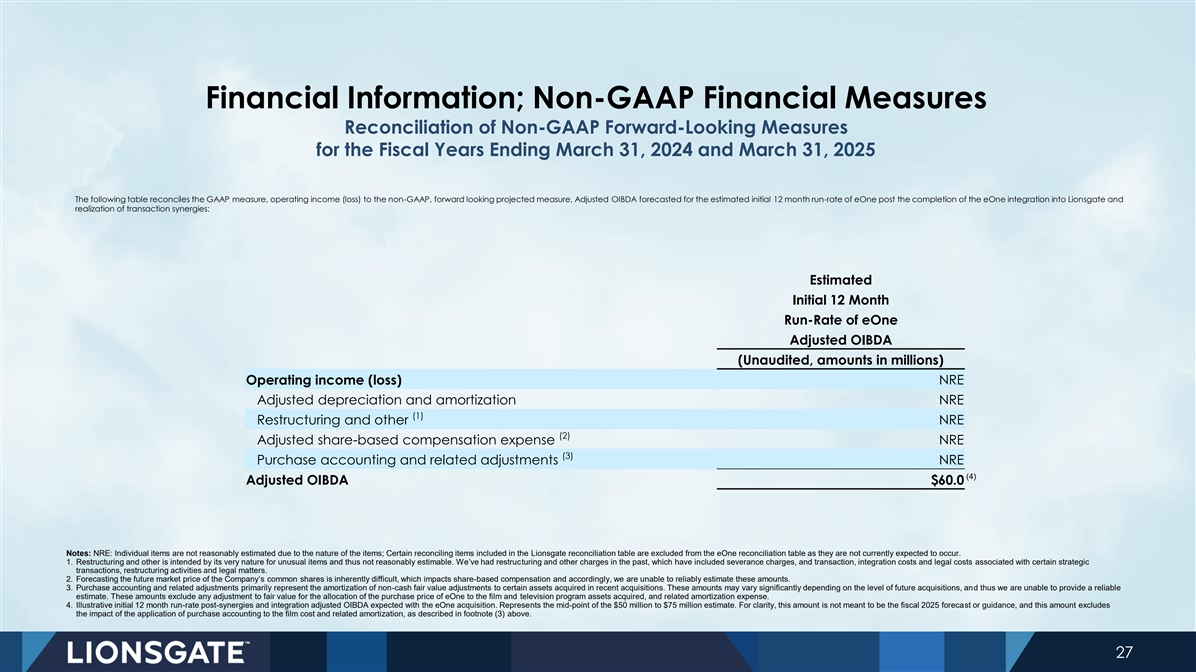
Financial Information; Non-GAAP Financial Measures Reconciliation of Non-GAAP Forward-Looking Measures for the Fiscal Years Ending March 31, 2024 and March 31, 2025 The following table reconciles the GAAP measure, operating income (loss) to the non-GAAP, forward looking projected measure, Adjusted OIBDA forecasted for the estimated initial 12 month run-rate of eOne post the completion of the eOne integration into Lionsgate and realization of transaction synergies: Estimated Initial 12 Month Run-Rate of eOne Adjusted OIBDA (Unaudited, amounts in millions) Operating income (loss) NRE Adjusted depreciation and amortization NRE (1) Restructuring and other NRE (2) Adjusted share-based compensation expense NRE (3) Purchase accounting and related adjustments NRE (4) Adjusted OIBDA $60.0 Notes: NRE: Individual items are not reasonably estimated due to the nature of the items; Certain reconciling items included in the Lionsgate reconciliation table are excluded from the eOne reconciliation table as they are not currently expected to occur. 1. Restructuring and other is intended by its very nature for unusual items and thus not reasonably estimable. We’ve had restructuring and other charges in the past, which have included severance charges, and transaction, integration costs and legal costs associated with certain strategic transactions, restructuring activities and legal matters. 2. Forecasting the future market price of the Company’s common shares is inherently difficult, which impacts share-based compensation and accordingly, we are unable to reliably estimate these amounts. 3. Purchase accounting and related adjustments primarily represent the amortization of non-cash fair value adjustments to certain assets acquired in recent acquisitions. These amounts may vary significantly depending on the level of future acquisitions, and thus we are unable to provide a reliable estimate. These amounts exclude any adjustment to fair value for the allocation of the purchase price of eOne to the film and television program assets acquired, and related amortization expense. 4. Illustrative initial 12 month run-rate post-synergies and integration adjusted OIBDA expected with the eOne acquisition. Represents the mid-point of the $50 million to $75 million estimate. For clarity, this amount is not meant to be the fiscal 2025 forecast or guidance, and this amount excludes the impact of the application of purchase accounting to the film cost and related amortization, as described in footnote (3) above. 27
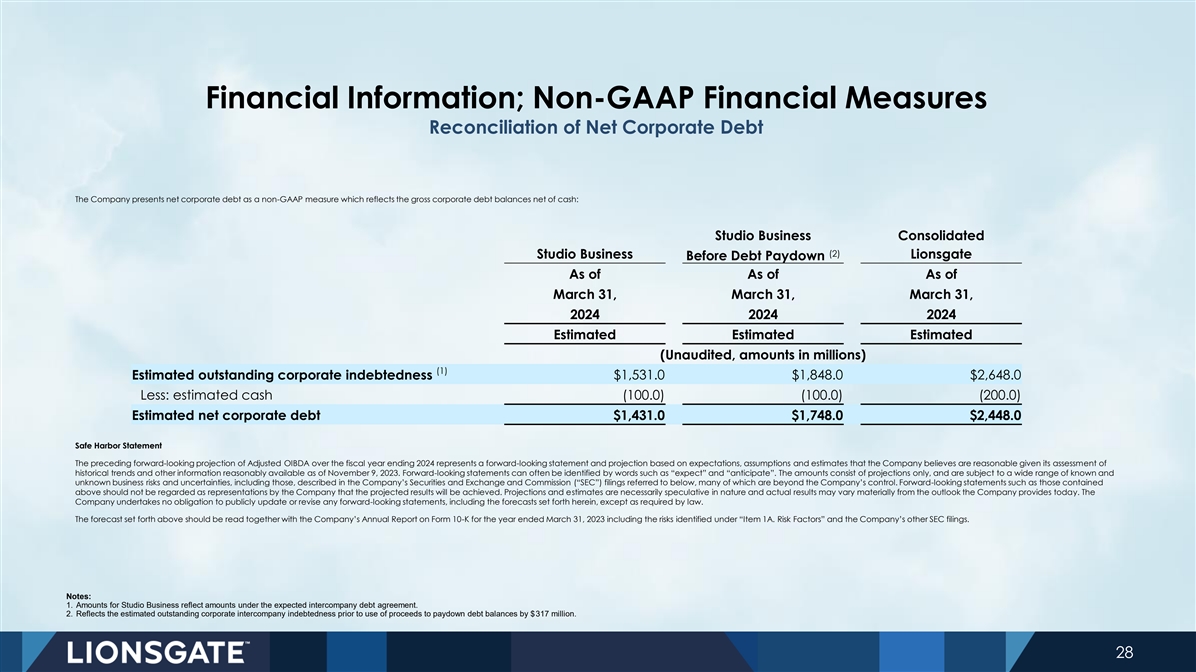
Financial Information; Non-GAAP Financial Measures Reconciliation of Net Corporate Debt The Company presents net corporate debt as a non-GAAP measure which reflects the gross corporate debt balances net of cash: Studio Business Consolidated (2) Studio Business Lionsgate Before Debt Paydown As of As of As of March 31, March 31, March 31, 2024 2024 2024 Estimated Estimated Estimated (Unaudited, amounts in millions) (1) Estimated outstanding corporate indebtedness $1,531.0 $1,848.0 $2,648.0 Less: estimated cash (100.0) (100.0) (200.0) Estimated net corporate debt $1,431.0 $1,748.0 $2,448.0 Safe Harbor Statement The preceding forward-looking projection of Adjusted OIBDA over the fiscal year ending 2024 represents a forward-looking statement and projection based on expectations, assumptions and estimates that the Company believes are reasonable given its assessment of historical trends and other information reasonably available as of November 9, 2023. Forward-looking statements can often be identified by words such as “expect” and “anticipate”. The amounts consist of projections only, and are subject to a wide range of known and unknown business risks and uncertainties, including those, described in the Company’s Securities and Exchange and Commission (“SEC”) filings referred to below, many of which are beyond the Company’s control. Forward-looking statements such as those contained above should not be regarded as representations by the Company that the projected results will be achieved. Projections and estimates are necessarily speculative in nature and actual results may vary materially from the outlook the Company provides today. The Company undertakes no obligation to publicly update or revise any forward-looking statements, including the forecasts set forth herein, except as required by law. The forecast set forth above should be read together with the Company’s Annual Report on Form 10-K for the year ended March 31, 2023 including the risks identified under “Item 1A. Risk Factors” and the Company’s other SEC filings. Notes: 1. Amounts for Studio Business reflect amounts under the expected intercompany debt agreement. 2. Reflects the estimated outstanding corporate intercompany indebtedness prior to use of proceeds to paydown debt balances by $317 million. 28

Summary Risk Factors Risks Related to Lionsgate Studios Risks Related to the Business Combination • Lionsgate Studios faces substantial capital requirements and financial risks. • If, following the business combination, securities or industry analysts do not publish or cease publishing research or reports about the combined company, its business, or its market, or if they change their recommendations regarding the combined company’s securities adversely, the • Lionsgate Studios may incur significant write-offs if its projects do not perform well enough to recoup costs. price and trading volume of the combined company’s securities could decline. • Changes in Lionsgate Studios’ strategy, plans for growth or restructuring may increase its costs or otherwise affect its profitability. • An active trading market for the combined company’s common shares may not be available on a consistent basis to provide shareholders • Lionsgate Studios’ revenues and results of operations may fluctuate significantly. with adequate liquidity. The market price of the combined company’s securities may be volatile, and shareholders could lose all or a significant part of their investment. • Lionsgate Studios does not have long-term arrangements with many of its production or co-financing partners. • Because there are no current plans for the combined company to pay cash dividends for the foreseeable future, shareholders may not • Lionsgate Studios relies on a few major retailers and distributors and the loss of any of those could reduce its revenues and operating results. receive any return on investment unless shares are sold for a price greater than that which was initially paid. • A significant portion of Lionsgate Studios’ library revenues comes from a small number of titles. • Shareholders will experience immediate and substantial dilution as a consequence of the issuance of common shares as consideration in the • Changes in consumer behavior, as well as evolving technologies and distribution models, may negatively affect Lionsgate Studios, financial business combination. Additionally, future sales and issuances of the combined company’s common shares or securities with rights to purchase condition or results of operations. the combined company’s common shares, including pursuant to the combined company’s equity incentive plans, or other equity securities or securities convertible into the combined company’s common shares (such as the conversion of SEAC’s Class B common shares into common • Lionsgate Studios expects to face substantial competition in all aspects of its business. shares of the combined company upon the completion of the business combination), could result in additional dilution of the percentage • Lionsgate Studios faces economic, political, regulatory, and other risks from doing business internationally. ownership of the combined company’s shareholders and could cause the market price of the combined company’s common shares to decline even if its business is doing well. • Lionsgate Studios will be subject to risks associated with possible acquisitions, dispositions, business combinations, or joint ventures. • If the combined company fails to establish and maintain effective internal controls, the combined company’s ability to produce accurate and • Lionsgate Studios’ success will depend on attracting and retaining key personnel and artistic talent. timely financial statements could be impaired, which could harm the combined company’s operating results, investors’ views of it, and, as a • Global economic turmoil and regional economic conditions could adversely affect Lionsgate Studios. result, the value of its common shares. • Lionsgate Studios could be adversely affected by labor disputes, strikes or other union job actions. • The combined company’s internal controls and procedures may not prevent or detect all errors or acts of fraud. • Business interruptions from circumstances or events out of Lionsgate Studios’ control could adversely affect Lionsgate Studios’ operations. • Changes to, or application of different, financial accounting standards (including PCAOB and GAAP standards) may result in changes to the combined company’s results of operations, which changes could be material. • Protecting and defending against intellectual property claims may have a material adverse effect on Lionsgate Studios. • Lionsgate Studios involves risks of liability claims for content of material, which could adversely affect Lionsgate Studios, results of operations • Provisions of Canadian law could delay or prevent a change in control of Lionsgate Studios, which could reduce the market price of the combined company’s common shares and frustrate attempts by its shareholders to make changes in management. and financial condition. • The combined company’s reported operating results may fluctuate significantly or may fall below the expectations of investors or securities • Piracy of films and television programs could adversely affect Lionsgate Studios over time. analysts, each of which may cause the market price of its securities to fluctuate or decline. • Service disruptions or failures of Lionsgate Studios or its third-party service providers’ information systems may disrupt its businesses, damage its • After the completion of the business combination, the combined company may be at an increased risk of securities class action litigation. reputation, expose it to regulatory investigations, actions, litigation, fines and penalties or have a negative impact on its results of operations including but not limited to a loss of revenue or profit, loss of customers or sales and other adverse consequences. • Lionsgate Studios may rely upon “cloud” computing services to operate certain aspects of its service and any disruption of or interference with its use of its “cloud” computing servicer could impact its operations and its business could be adversely impacted. • Lionsgate Studios’ activities are subject to stringent and evolving obligations which may adversely impact its operations. Lionsgate Studios’ actual or perceived failure to comply with such obligations could lead to regulatory investigations or actions, litigation, fines and penalties, disruptions of its business operations, reputational harm, loss of revenue or profits, loss of customers or sales, and other adverse business consequences. • LG Studio may incur debt obligations that could adversely affect its business and profitability and its ability to meet other obligations. • The Internal Revenue Service may not agree that LG Studio should be treated as a non-U.S. corporation for U.S. federal tax purposes and may not agree that its U.S. affiliates should not be subject to certain adverse U.S. federal income tax rules. • Future changes to U.S. and non-U.S. tax laws could adversely affect Lionsgate Studios. • Changes in foreign, state and local tax incentives may increase the cost of original programming content to such an extent that they are no longer feasible. • LG Studio’s tax rate is uncertain and may vary from expectations. • Legislative or other governmental action in the U.S. could adversely affect Lionsgate Studios. • Changes in, or interpretations of, tax rules and regulations, and changes in geographic operating results, may adversely affect LG Studio’s effective tax rates. 29
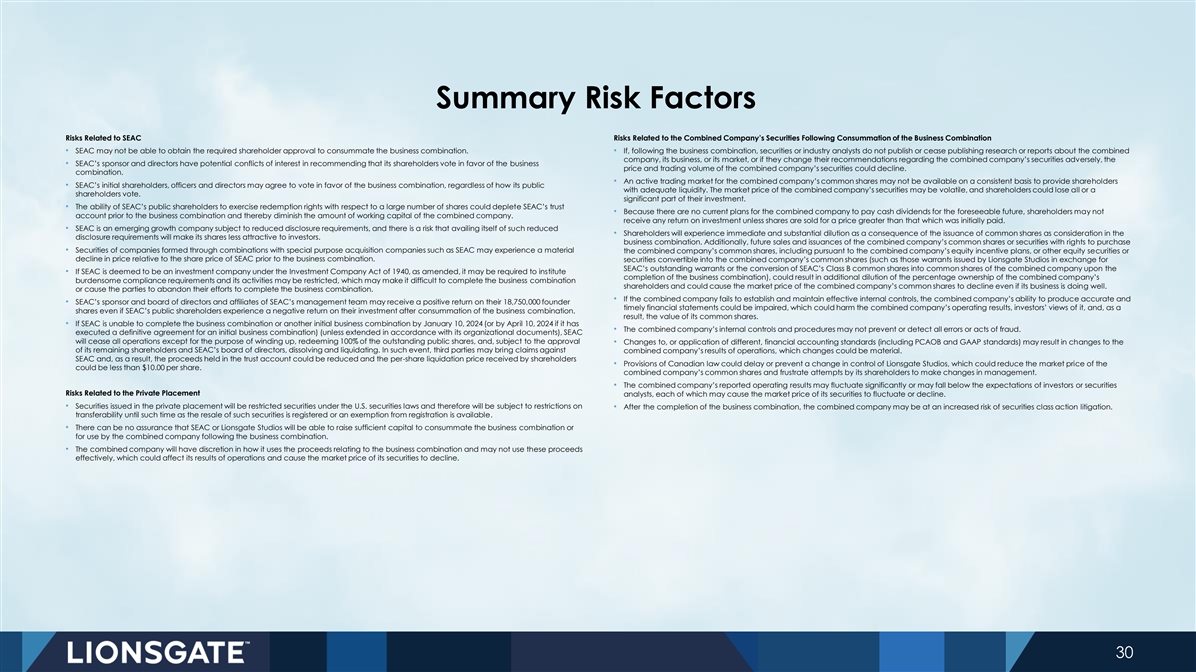
Summary Risk Factors Risks Related to SEAC Risks Related to the Combined Company’s Securities Following Consummation of the Business Combination • SEAC may not be able to obtain the required shareholder approval to consummate the business combination. • If, following the business combination, securities or industry analysts do not publish or cease publishing research or reports about the combined company, its business, or its market, or if they change their recommendations regarding the combined company’s securities adversely, the • SEAC’s sponsor and directors have potential conflicts of interest in recommending that its shareholders vote in favor of the business price and trading volume of the combined company’s securities could decline. combination. • An active trading market for the combined company’s common shares may not be available on a consistent basis to provide shareholders • SEAC’s initial shareholders, officers and directors may agree to vote in favor of the business combination, regardless of how its public with adequate liquidity. The market price of the combined company’s securities may be volatile, and shareholders could lose all or a shareholders vote. significant part of their investment. • The ability of SEAC’s public shareholders to exercise redemption rights with respect to a large number of shares could deplete SEAC’s trust • Because there are no current plans for the combined company to pay cash dividends for the foreseeable future, shareholders may not account prior to the business combination and thereby diminish the amount of working capital of the combined company. receive any return on investment unless shares are sold for a price greater than that which was initially paid. • SEAC is an emerging growth company subject to reduced disclosure requirements, and there is a risk that availing itself of such reduced • Shareholders will experience immediate and substantial dilution as a consequence of the issuance of common shares as consideration in the disclosure requirements will make its shares less attractive to investors. business combination. Additionally, future sales and issuances of the combined company’s common shares or securities with rights to purchase • Securities of companies formed through combinations with special purpose acquisition companies such as SEAC may experience a material the combined company’s common shares, including pursuant to the combined company’s equity incentive plans, or other equity securities or decline in price relative to the share price of SEAC prior to the business combination. securities convertible into the combined company’s common shares (such as those warrants issued by Lionsgate Studios in exchange for SEAC’s outstanding warrants or the conversion of SEAC’s Class B common shares into common shares of the combined company upon the • If SEAC is deemed to be an investment company under the Investment Company Act of 1940, as amended, it may be required to institute completion of the business combination), could result in additional dilution of the percentage ownership of the combined company’s burdensome compliance requirements and its activities may be restricted, which may make it difficult to complete the business combination shareholders and could cause the market price of the combined company’s common shares to decline even if its business is doing well. or cause the parties to abandon their efforts to complete the business combination. • If the combined company fails to establish and maintain effective internal controls, the combined company’s ability to produce accurate and • SEAC’s sponsor and board of directors and affiliates of SEAC’s management team may receive a positive return on their 18,750,000 founder timely financial statements could be impaired, which could harm the combined company’s operating results, investors’ views of it, and, as a shares even if SEAC’s public shareholders experience a negative return on their investment after consummation of the business combination. result, the value of its common shares. • If SEAC is unable to complete the business combination or another initial business combination by January 10, 2024 (or by April 10, 2024 if it has • The combined company’s internal controls and procedures may not prevent or detect all errors or acts of fraud. executed a definitive agreement for an initial business combination) (unless extended in accordance with its organizational documents), SEAC will cease all operations except for the purpose of winding up, redeeming 100% of the outstanding public shares, and, subject to the approval • Changes to, or application of different, financial accounting standards (including PCAOB and GAAP standards) may result in changes to the of its remaining shareholders and SEAC’s board of directors, dissolving and liquidating. In such event, third parties may bring claims against combined company’s results of operations, which changes could be material. SEAC and, as a result, the proceeds held in the trust account could be reduced and the per-share liquidation price received by shareholders • Provisions of Canadian law could delay or prevent a change in control of Lionsgate Studios, which could reduce the market price of the could be less than $10.00 per share. combined company’s common shares and frustrate attempts by its shareholders to make changes in management. • The combined company’s reported operating results may fluctuate significantly or may fall below the expectations of investors or securities Risks Related to the Private Placement analysts, each of which may cause the market price of its securities to fluctuate or decline. • Securities issued in the private placement will be restricted securities under the U.S. securities laws and therefore will be subject to restrictions on • After the completion of the business combination, the combined company may be at an increased risk of securities class action litigation. transferability until such time as the resale of such securities is registered or an exemption from registration is available. • There can be no assurance that SEAC or Lionsgate Studios will be able to raise sufficient capital to consummate the business combination or for use by the combined company following the business combination. • The combined company will have discretion in how it uses the proceeds relating to the business combination and may not use these proceeds effectively, which could affect its results of operations and cause the market price of its securities to decline. 30
[End of Communication]
Additional Information About the Transaction and Where to Find It
In connection with the transaction, SEAC II Corp., a subsidiary of Screaming Eagle (“New Screaming Eagle”) has filed with the U.S. Securities and Exchange Commission (the “SEC”) a registration statement on Form S-4 (as may be amended, the “Registration Statement”), which includes both a preliminary proxy statement of Screaming Eagle and a preliminary prospectus of New Screaming Eagle, and after the Registration Statement is declared effective, Screaming Eagle will mail the definitive proxy statement/prospectus relating to the transaction to its shareholders and public warrant holders as of the respective record date to be established for voting at the meeting of its shareholders (the “Screaming Eagle Shareholders Meeting”) and public warrant holders (“Screaming Eagle Public Warrant Holder Meeting”) to be held in connection with the transaction. The Registration Statement, including the proxy statement/prospectus contained therein, contains important information about the transaction and the other matters to be voted upon at the Screaming Eagle Shareholders Meeting and Screaming Eagle Public Warrant Holder Meeting. This communication does not contain all the information that should be considered concerning the transaction and other matters and is not intended to provide the basis for any investment decision or any other decision in respect of such matters. Screaming Eagle, New Screaming Eagle and Lionsgate may also file other documents with the SEC regarding the transaction. Screaming Eagle’s shareholders, public warrant holders and other interested persons are advised to read, when available, the Registration Statement, including the preliminary proxy statement/prospectus contained therein, the amendments thereto and the definitive proxy statement/prospectus and other documents filed in connection with the transaction, as these materials will contain important information about Screaming Eagle, New Screaming Eagle, Lionsgate, Studio Business and the transaction.
Screaming Eagle’s shareholders, public warrant holders and other interested persons will be able to obtain copies of the Registration Statement, including the preliminary proxy statement/prospectus contained therein, the definitive proxy statement/prospectus and other documents filed or that will be filed with the SEC, free of charge, by Screaming Eagle, New Screaming Eagle and Lionsgate through the website maintained by the SEC at www.sec.gov.
Participants in the Solicitation
Screaming Eagle, New Screaming Eagle, Lionsgate and their respective directors and officers may be deemed participants in the solicitation of proxies of Screaming Eagle shareholders and public warrant holders in connection with the transaction. More detailed information regarding the directors and officers of Screaming Eagle, and a description of their interests in Screaming Eagle, is contained in Screaming Eagle’s filings with the SEC, including its Annual Report on Form 10-K for the fiscal year ended December 31, 2022, which was filed with the SEC on March 1, 2023, and is available free of charge at the SEC’s website at www.sec.gov. Information regarding the persons who may, under SEC rules, be deemed participants in the solicitation of proxies of Screaming Eagle’s shareholders and public warrant holders in connection with the transaction and other matters to be voted upon at the Screaming Eagle Shareholders Meeting and SEAC Public Warrant Holders Meeting will be set forth in the Registration Statement for the transaction when available.
Forward-Looking Statements
This communication includes certain statements that may constitute “forward-looking statements” within the meaning of Section 27A of the Securities Act, and Section 21E of the Exchange Act. Forward-looking statements include, but are not limited to, statements that refer to projections, forecasts or other characterizations of future events or circumstances, including any underlying assumptions. The words “anticipate,” “believe,” “continue,” “could,” “estimate,” “expect,” “intends,” “may,” “might,” “plan,” “possible,” “potential,” “predict,” “project,” “seek,” “should,” “target,” “would” and similar expressions may identify forward-looking statements, but the absence of these words does not mean that a statement is not forward-looking. Forward-looking statements may include, for example, statements about the Screaming Eagle or Lionsgate’s ability to effectuate the transaction discussed in this document; the benefits of the transaction; the future financial performance of Lionsgate Studios (which will be the go-forward public company following the completion of the transaction) following the transactions; changes in Lionsgate’s strategy, future operations, financial position, estimated revenues and losses, projected costs, prospects, plans and objectives of management. These forward-looking statements are based on information available as of the date of this document, and current expectations, forecasts and assumptions, and involve a number of judgments, risks and uncertainties. Accordingly, forward-looking statements should not be relied upon as representing Screaming Eagle, Lionsgate or New Screaming Eagle’s views as of any subsequent date, and none of Screaming Eagle, Lionsgate or New Screaming Eagle undertakes any obligation to update forward-looking statements to reflect events or circumstances after the date they were made, whether as a result of new information, future events or otherwise, except as may be required under applicable securities laws. Neither New Screaming Eagle nor Screaming Eagle gives any assurance that either New Screaming Eagle or Screaming Eagle will achieve its expectations. You should not place undue reliance on these forward-looking statements. As a result of a number of known and unknown risks and uncertainties, New Screaming Eagle’s actual results or performance may be materially different from those expressed or implied by these forward-looking statements. Some factors that could cause actual results to differ include: (i) the timing to complete the transaction by Screaming Eagle’s business combination deadline and the potential failure to obtain an extension of the business combination deadline if sought by Screaming Eagle; (ii) the occurrence of any event, change or other circumstances that could give rise to the termination of the definitive agreements relating to the transaction; (iii) the outcome of any legal, regulatory or governmental proceedings that may be instituted against New Screaming Eagle, Screaming Eagle, Lionsgate or any investigation or inquiry following announcement of the transaction, including in connection with the transaction; (iv) the inability to complete the transaction due to the failure to obtain approval of Screaming Eagle’s shareholders or Screaming Eagle’s public warrant holders; (v) Lionsgate’s and New Screaming Eagle’s success in retaining or recruiting, or changes required in, its officers, key employees or directors following the transaction; (vi) the ability of the parties to obtain the listing of Lionsgate Studios’ Common Shares on a national securities exchange upon the date of closing of the transaction; (vii) the risk that the transaction disrupts current plans and operations of Lionsgate; (viii) the ability to recognize the anticipated benefits of the transaction; (ix) unexpected costs related to the transaction; (x) the amount of redemptions by Screaming Eagle’s public shareholders being greater than expected; (xi) the management and board composition of Lionsgate Studios following completion of the transaction; (xii) limited liquidity and trading of Lionsgate Studios’ securities following completion of the transactions; (xiii) changes in domestic and foreign business, market, financial, political and legal conditions, (xiv) the possibility that Lionsgate or Screaming Eagle may be adversely affected by other economic, business, and/or competitive factors; (xv) operational risks; (xvi) litigation and regulatory enforcement risks, including the diversion of management time and attention and the additional costs and demands on Lionsgate’s resources; (xvii) the risk that the consummation of the transaction is substantially delayed or does not occur; and (xix) other risks and uncertainties indicated from time to time in the Registration Statement, including those under “Risk Factors” therein, and in the other filings of Screaming Eagle, New Screaming Eagle and Lionsgate with the SEC.
No Offer or Solicitation
This communication does not constitute (i) a solicitation of a proxy, consent or authorization with respect to any securities or in respect of the transaction or (ii) an offer to sell, a solicitation of an offer to buy, or a recommendation to purchase, any securities of Lionsgate, Screaming Eagle, the combined company or any of their respective affiliates. No offering of securities shall be made except by means of a prospectus meeting the requirements of Section 10 of the Securities Act of 1933, as amended, or an exemption therefrom, nor shall any sale of securities in any states or
jurisdictions in which such offer, solicitation or sale would be unlawful prior to registration or qualification under the securities laws of any such jurisdiction be affected. No securities commission or securities regulatory authority in the United States or any other jurisdiction has in any way passed upon the merits of the transaction or the accuracy or adequacy of this communication.